Morsi must go say Egyptian People
Egyptian Embassy, London. Sun 30 Jun 2013
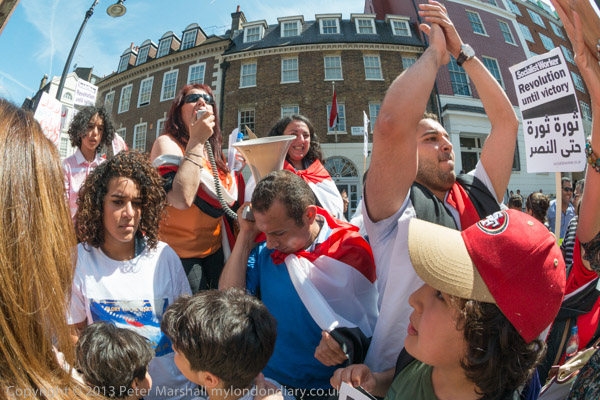
'Revolution until victory' - the crowd opposite the
Egyptian embassy
more pictures
Egyptians from the UK voiced their continuing support of freedom, justice and human rights in Egypt at the embassy in solidarity with the mass protests against the Muslim Brotherhood government in Egypt today.
The protesters see today's protests in Egypt as the third wave of their great January revolution in 2011 when "millions of Egyptians came out demanding bread, freedom, social justice and human dignity in order to overthrow the regime of tyranny and exploitation". Their protests brough down the dictatorship of Mubarak and later the military junta under Field Marshall Tantawi that replaced it, and now they want an end to the Muslim Brotherhood dominated government, which they say has betrayed the spirit of the revolution.
They complain that the government has put Muslim Brotherhood billionaire Khairat al-Shater in charge of business and have gone begging to the International Monetary Fund and made friends of the US and Israeli president Shimon Peres.
They accuse them of breaking promises and of killing and injuring dozens of Egyptians, and say that they have lost the trust of the people - who are now out on the streets against them. Some say that they will not leave the streets until president Mohamed Morsi and his failed Muslim Brotherhood regime have been replaced by a revolutionary transitional government which makes social justice and security its highest priority.
Around a hundred protesters had arrived by the start of the protest, and when I left an hour later there were around 500 packed into the street opposite the embassy, keeping up a continued chanting of slogans and singing of Egyptian songs. Many had placards, some in English, calling on Morsi to go, and there were large photographs of some of those killed and injured by the Morsi government along the front of the protest. There were also placards showing solidarity between the people of Egypt, both Christian and Muslim, and a number of those taking part were in Muslim dress.
The English version of some of the slogans didn't sound as good as the originals in Egyptian Arabic, but at least I could understand them:
We won't abandon anything;
Our human rights is all we want;
Social justice and some bread to eat;
We will no longer be quiet and hide;
Enough injustice and poverty;
Enough of what's been done to us;
Revolution until victory;
Egypt's youth is brave and her people are heroes;
We will not foget the blood of our martyrs, Muslim and Christian;
No more pain, tyranny and corruption;
Long live freedom.
One counter-protester came with his wife and child and held up pictures of
Mohamed Morsi, shouting in support of him. Police quickly led him away and
told him he had to stop protesting here.
more pictures
Pride Celebrates Love and Marriage
Baker St - Trafalgar Square, London. Sat 29 Jun 2013
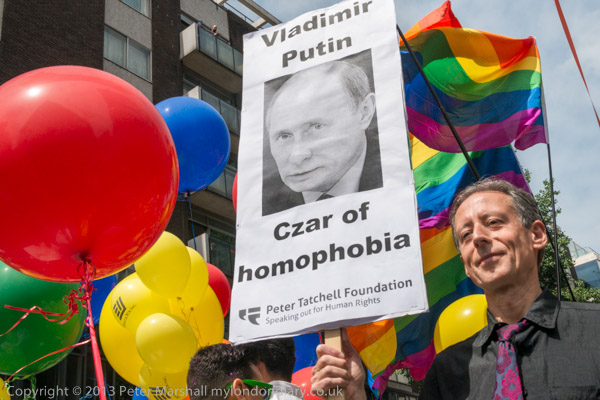
Peter Tatchell with a placard against 'Vladimir Putin, Czar of homophobia'
more pictures
The over 150 groups in the 2013 Pride Parade welcomed the equal marriage Bill in England and Wales and celebrated the love that binds the London LGBT+ community together and links it with the wider community.
Pride has for years become a celebration of gay lifestyle, with a large participation by corporates who profit from this, but at least this year the overall theme was related to a political event, and there were I think more groups who were protesting than in some previous years. As usual there was a trade union presence, and a strong turnout from groups such as Stonewall who were prominent in the campaign for gay rights. In the pictures I've tried to represent as many of the different groups that take part in Pride, and in particular those dressed to represent the theme.
I photographed the marchers as they prepared and left from Baker St, and,
after taking some time out met some of them again at Trafalgar Square.
more pictures
UAF Oppose, EDL Don't Come
Hyde Park, London. Sat 29 Jun 2013
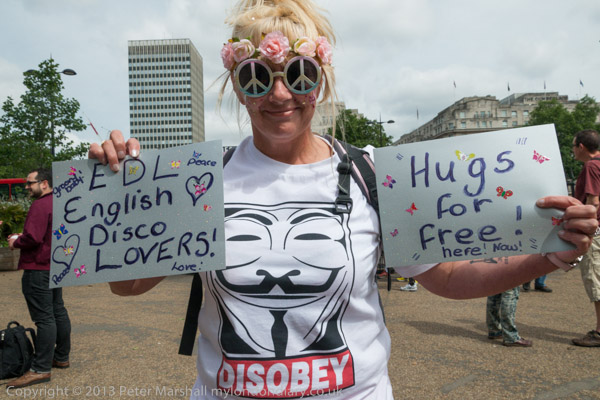
The only EDL present were English Disco Lovers
more pictures
Unite Against Fascism activists at Hyde Park greeted news that EDL 'charity marchers' Stephen Lennon and Kevin Carroll had been arrested in East London. The EDL failed to turn up for the planned support march in London.
Police had banned Lennon (who likes to be called Tommy Robinson) and Carroll from entering Tower Hamlets to walk past the East London Mosque in Whitechapel, suggesting alternative routes. UAF activists gathered in Hyde Park cheered when they heard that police had stopped and arrested them when they tried to ignore the ban.
The police had also imposed a ban on under the Public Order Act preventing any assembly or procession in Woolwich. The EDL were allowed to march from Hyde Park to protest near Parliament, and Unite Against Fascism had obtained permission for a march in protest against the EDL.
Around 50 to 100 anti-fascists had turned up in Hyde Park, intending to walk to the advertised starting point of the EDL march and show their opposition. But there was no sign of the EDL either there or later in Westminster where they had been given permisison to hold a rally.
Both the EDL and anti-fascist opposition groups from South London had planned
to go to Woolwich this afternoon although the rally had been banned. There
were reports of a small group of EDL supporters in a Woolwich pub this afternoon,
but it didn't seem worth travelling there.
more pictures
Cleaners Surprise Senate House Invasion
Senate House, University of London. Fri 28 Jun 2013
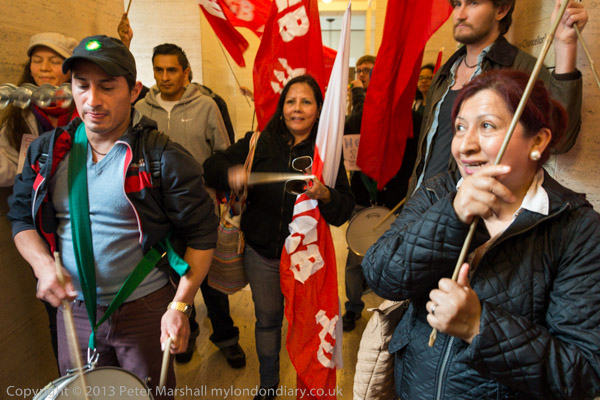
Cleaners make a lot of noise outside the Vice-Chancellors
office in Senate House
more pictures
Low paid workers employed by contract companies at London University and their supporters ran into the Senate House and protested noisily inside the building for sick pay, holidays and pensions for all workers at the University.
The protest was another in a continuing 'Summer of Action' organised by the '3 Cosas' group, supported by the grass roots IWGB union (Independent Workers of Great Britain) and the students of the ULU (University of London Union.)
Although the cleaners, security guards and catering staff work in the same buildings as other service staff employed by the university, these low paid workers have brutally inferior conditions of service as they are 'outsourced', employed on behalf of the university by contracting companies. While people they work alongside enjoy the kind of conditions that would be expected of a considerate employer - London University - with good conditions of sick pay and holidays and a pension scheme, those employed by contractors are on the rock-bottom. The get only statutory sick pay and holidays and few if any are in pension schemes. On top of this they often have to put up with harsh and unreasonable demands, derogatory treatment and even racism from the managers of the contract companies.
Sick pay, holidays and pensions are the '3 Cosas' (3 causes) on which they are campaigning, demanding that either London University take them back into direct employment or at least insist as a condition of contracts that all those providing staff to work at the university should provide them with the same levels of sick pay, holidays and pensions as those of directly employed staff.
Today's protest people was unnannounced, intended to take the University authorities by surprise, and it did. I met the protesters as they gathered in the lobby of SOAS and walked with them as they made their way quietly towards the Senate House, carrying flags, drums and other percussion. As soon as they got within sight of the Senate House entrance they broke into a run, going though the doors and inside the building before the security guards realised what was happening.
Inside they walked through reception and went into a large lobby (Crush Hall) in front of the Macmillan Hall, where conference attendees were finishing their lunch before returning to the hall. They stopped briefly there, making some noise and using a megaphone to explain who they were and why they were protesting before going up the stairs and along a short dark corridor to protest in front of the doors leading to the Vice Chancellor's office.
After five minutes of very noisy protest there, they retreated to make a
tour of the balconies around the lobby, before going back down the stairs
into the lobby to continue there. They made a brief surge into the Macmillan
Hall, where people were still taking their seats, but were met by two security
guards who held out their arms and asked them to leave - which they did, continuing
to protest and hand out a flyer about their greivances. Finally, after another
tour around the balconies, around twenty minutes after they had entered the
building they marched out and back towards SOAS, where the protest ended.
more pictures
Say No To Torture
Trafalgar Square, London. Wed 26 Jun 2013
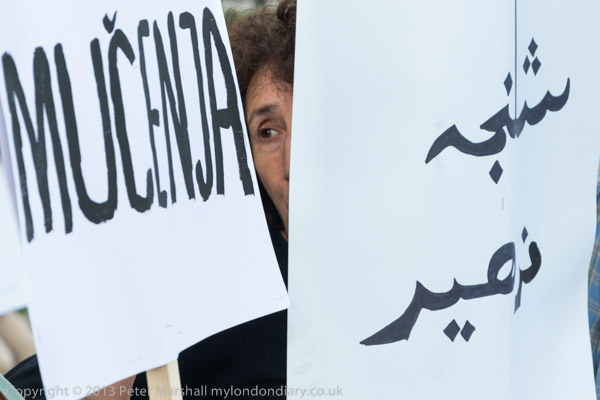 A
woman peeps out between signs in different languages saying 'No to Torture'
in the Trafalgar Square demo
A
woman peeps out between signs in different languages saying 'No to Torture'
in the Trafalgar Square demo
more pictures
A protest in Trafalgar Square on the 'International Day in Support of Victims of Torture', the anniversary of the UN Convention Against Torture on 26 June 1987 called for an end to torture worldwide and the release of Shaker Aamer from Guantanamo.
The protest 'Say No to Torture' was organised by the London Guantanamo Campaign which has been active in calling for the closure of Guantanamo and other prisons including Bagaram in Afghanistan since 2006. In particular the protest drew attention to Shaker Aamer, one of 166 prisoners still held in Guantanamo, a London resident who was captured by bandits in Afghanistan where he was working for a medical charity and sold to the American forces, who tortured him - with the cooperation of the British Secret Service in Bagram, before illegally rendering him to Guantanamo where he continues to be tortured despite having been cleared for release. Currently he is in very poor health having been - along with the majority of the other prisoners there - on hunger strike for 141 days.
The US response to the hunger strike has been to toughen up the conditions under which the men are held, including regular beatings, to keep those taking part in solitary confinement and to forcibly feed them, strapping them into a special chair and forcing a feeding tube up a nostril and down into their stomach. The procedure is extremely painful and both this and the sensory deprivation of solitary confinement in bare cells also constitute torture under the UN definitions.
People taking part in the protest stood in a line in front of the National Gallery, some wearing orange Guanatanamo-style jump suits and black hoods. The held up placards and banners including over 30 placards which said 'No to Torture' in different languages. These attracted the attention of many of those passing by who were mostly tourists and were intrigued to see a placard in their own language, and stopped to read the displays on the pavement and to talk with the protesters.
Some of those present were from the 'Save Shaker Aamer Campaign' which is holding daily three hour lunchtime vigils opposite the House of Commons while Parliament is in session to put pressure on the UK Government to press for the release of Aamer so that he can return to live with his family in Battersea. The US authorities have no evidence against him and have twice cleared him for release, but he remains suffering in jail - and currently near death - because the release of prisoners is politically inconvenient for the US Administration.
David Cameron raised Shaker’s case with President Obama at the recent G8 summit, the first time a British Prime Minister has done so, and has told Parliament he will write to him with specific details of what needs to happen next. He need to remind the US government that their obligations under international human rights law override an US domestic laws, and that in any case there is a waiver in place that would allow him to be returned.
The 'Say No To Torture' protest overlapped with another human rights protest over Balochistan, a 'nation without a state.' Balochs live mainly in Pakistan and have been subject to arrests and other human rights violations including torture by the Pakistan authorities for campaigning for independence. The protesters held pictures of a number of Baloch activists who have simply disappeared, believed to be held or possibly killed by Pakistani forces. Some of them joined in the 'Say No to Torture' protest, holding up the placards in various languages with this message.
Protesters also drew attention to the US treatment of Talha Ahsan, one of
several people extradited from the UK. An award-winning British poet and translator
who suffers from Aspergers syndrome, he is alleged to have been associated
from 1997-2004 with an Islamic web site and publishing house which is said
to have links with terrorism and is currently awaiting trial in solitary confinement
in a high-security state prison in Connecticut.
more pictures
Stratford Greenway Olympic Revisit
The Greenway, Stratford Marsh, London. Wed 26 Jun 2013
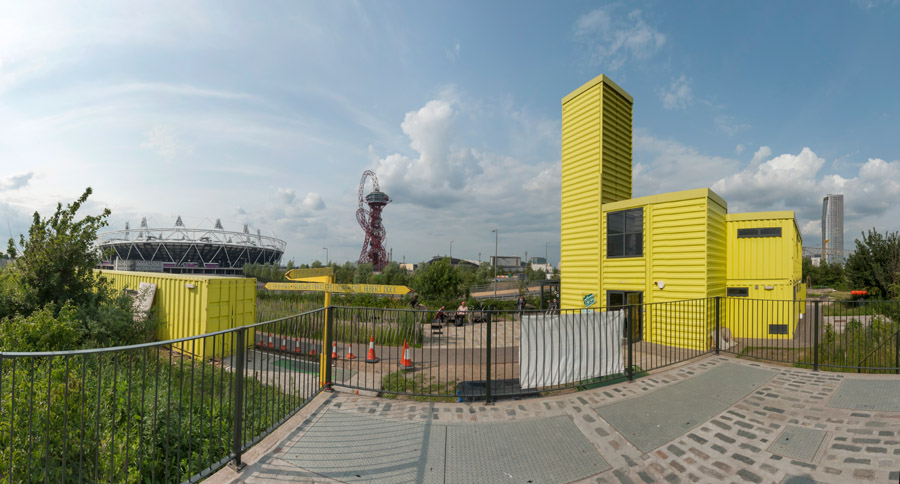
The View Tube unfortunately closes at 5pm and I just
missed it
more pictures
On my way back into London called in to take a look and make a few panoramas of the former Olympic site - continuing the series of photographs I started in the 1980s - search this site to see some more, with earlier work on my River Lea/Lee Valley site - and in the Blurb book.
At the moment the former site is pretty empty and there were very few people
around on the Greenway, which is still closed between the View Tube and Stratford
High St. Possibly business will pickup again when it - and the former Olympic
Park are reopened.
more pictures
Victoria Dock and Silvertown
London. Wed 26 Jun 2013
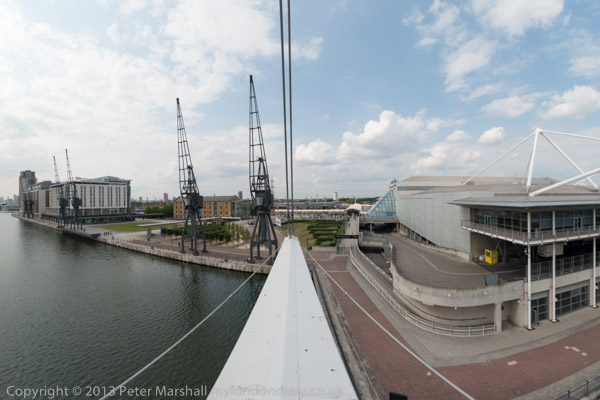
Panorama from the High Level Bridge at R Victoria Dock
more pictures
Unfortunately I think the more interesting parts of the Thames shoreline here are not publicly accessible, but you can - at least most of the time - walk along by R Victoria Dock and across the high level bridge for some more interesting views. It gets closed when they are flogging arms at the Excel Centre fairs (if you represent a despotic government you'll have a ticket to that anyway.)
From the other side it's a dull but fairly short walk to the DLR - if you've got time you can spend it in the Thames Barrier Park - where you can take the train back towards Stratford. For a more scenic route change at Canning Town for the DLR to Canary Wharf, which makes a nice swoop across Bow Creek. And for a special bonus every day until September 27, 2013 you can drop in at the Museum of London Docklands (5 minutes walk from West India Quay or Canary Wharf) and see my work - and that by 11 other artists in the show 'Estuary'.
I made a few panoramas too:
more pictures
Emirates 'Airline' - Arab Dangleway
North Greenwich - Victoria Dock, London. Wed 26 Jun 2013
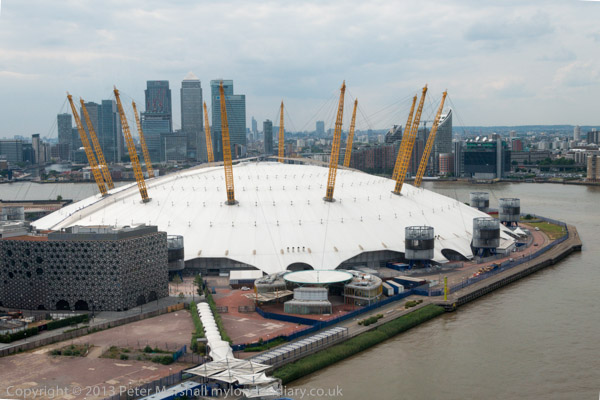 The
Dome and Canary Wharf from the Dangleway
The
Dome and Canary Wharf from the Dangleway
more pictures
Whichever way you name it, officially or in Diamond Geezer's mocking term, in transport terms its a joke, a slower and more expensive route on almost any possible journey. But it should be promoted as one of London's cheaper and more interesting tourist attractions, giving a rather better view than the helter-skelter on the Olympic site at around a tenth of the cost, and with the added attraction of motion in three dimensions.
Given the huge losses it is sustaining I can't see it remaining open too much longer, so if you've not taken a ride don't leave it too long. For a pointless but entertaining round trip I'd suggest you do as I did, take the Jubillee to North Greenwich and walk north out of the station to the southern terminal. (For some reason I didn't manage to work out the signs in North Greenwich station seem to send you in the opposite direction.) With a Travelcard you get a reduced price fare - £3.20 for a single, and walk onto one of the pods. The service doesn't run if its windy, so check before you travel.
You get some great views along the Thames in both directions, with London
in the distance, Canary Wharf andthe Olympic site a little closer and Bow
Creek, Silvertown and the Dome both nearly underneath. Movement across is
a little erratic, and my journey took around 10 minutes rather than the 7
minutes according to TfL. Some people get a return and stay in the pod, but
I think its better to take a walk on the other side (see next post above.)
more pictures
Teachers March for Education
Westminster, London. Tues 25 Jun 2013
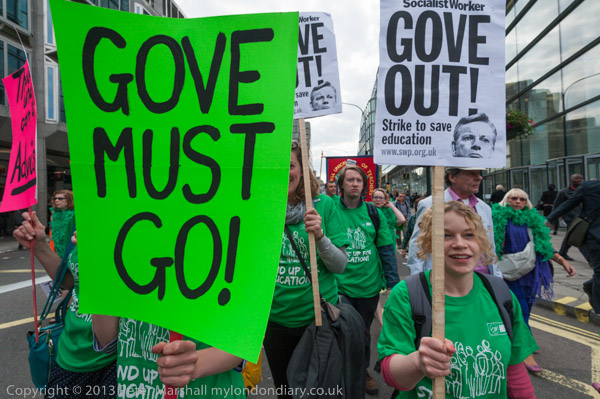 Teachers
say Gove ignores all the evidence on education, attacks teachers and brings
in half-baked schemes
Teachers
say Gove ignores all the evidence on education, attacks teachers and brings
in half-baked schemes
more pictures
Teachers from the London area marched through central London today past the Department for Education to a rally. They shouted 'Gove Must Go!' and called for the government to cease attacks on teachers and stop undermining our education system.
The march came two days before NUT and NASUWT members across twenty-two Local Authorities in the North-West of England are being called upon to take region-wide strike action with rallies in Manchester, Preston, Chester and Liverpool.
Peter Glover, Liverpool NUT and NUT National Executive member for Merseyside and Cheshire earlier gave the reasons for the forthcoming action:
"Pay, pensions, workload, holidays, OFSTED, surveillance…the attacks on teachers have never been as severe. In many schools this Government has created an atmosphere of terror. Managers with no teaching responsibility roam schools armed with clipboards and OFSTED-inspired grids, pouncing on teachers. 'Drop-ins' that turn into capability procedures are the vogue."
Many teachers feel that Minister Michael Gove is setting out to smash the teaching unions in the way that the Thatcher government took on the miners. Teaching is a highly unionised profession, and thus a prime candidate for attack. But teachers join teaching unions because they see them as working not just for their own interests, but more generally for education and for children, protecting educational standards against the attacks by successive governments. They are not just trade unions but professional bodies.
On the day the London march took place, London's evening newspaper ran a double page feature on a severely overcrowded five-form entry primary school in the London Borough of Dagenham, which is now crammed full of temporary classrooms. London is facing a demographic time-bomb, with rapidly increasing numbers - as many as 100,000 more school places expected to be needed.
Government plans for free schools and academies seem increasingly irrelevant, producing only a small number of new school places, and these largely in the wrong areas. The crisis in places needs proper planning by local authorities and investment through them by central government, privatisation simply undermines proper planning, as well as leading to distortions in what is taught and how schools are managed.
Teachers are appalled by government decisions to let schools employ unqualified people as teachers, and determined to protect the national pay system and to stop attacks on working conditions. They are also opposing plans to increase the retirement age to 68. Teaching is a very stressful career and as they say, '68 is too late'.
The march was well attended, and many schools and areas had brought their banners. They had been asked to wear green, and many changed into the green 'Stand Up For Education' NUT t-shirts and it was an impressive sight marching along Victoria St from Westminster Cathedral where the march formed up.
On the way they were joined by Jolyon Rubinstein and Heydon Prowse of the TV satire show 'The Revolution Will Be Televised', dressed in suits with a blue and an orange rosette representing the two coalition parties, who came to tell them that they really didn't need to protest as the government was doing such a good job. Some of the teachers seemed a little upset and felt that these two actors were mocking them and making use of the protest for their own purposes.
The march turned down Great Smith Street to pass the Ministry for Education,
where the stewards had a job to keep marchers moving and on the opposite side
of the road to the Ministry, and there was some very noisy shouting against
the destructive policies of Michael Gove, who seems unable or unwilling to
take notice of educational research or the views of experts in the field in
formulating educational policy. The march ended a short distance further on
with a rally in the Emmanuel Centre, but I left as the marchers entered for
this.
more pictures
Gurdwara Rebuilt After Arson
Bow, London. Sun 23 Jun 2013
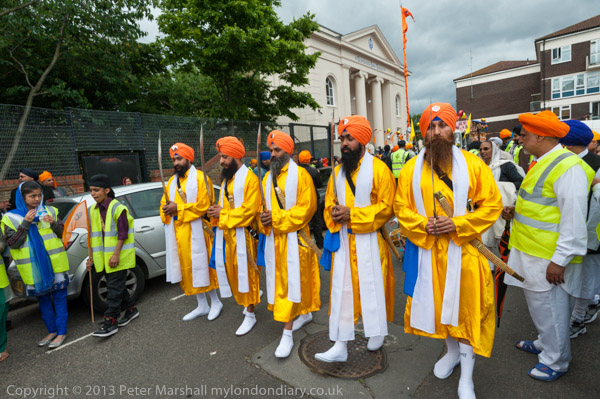
Sikhs celebrated the re-opening with a procession (Nagar
Kirtan) around the area
more pictures
A Sikh temple in Bow, destroyed by an unknown arsonist in March 2009 was opened today after rebuilding with a procession by the congregation following the Guru Granth Sahib (the Sikh Holy Scripture) around the local area.
The building on Harley Grove, built as the classical-style Harley Street Congregational chapel in 1854-5 became the Mile End and Bow Great Synagogue in 1927, and having fallen into disuse was sold in 1977 to the Bhart Sikhs, a congregation that orginated in a few villages in Pakistan, who had begun to settle in the UK shortly after the partition of India in 1947. Over the years the community had grown, and more had joined them from India, so they had outgrown their nearby Gurdwara. The new Harley Grove Gurdwara opened in 1979 after renovation.
Thirty years later, on 6th March 2009, the building was destroyed by an arson attack; despite police efforts and an offered reward of £50,000 the arsonist remains unknown. The attack shocked Sikhs around the world and efforts began to rebuild the Gurdwara, with enhanced size and more facilities, and today's procession and ceremonies marked its official opening.
The end of Harley Grove in front of the Gurdwara was packed as the five Sikh Khalsa with swords raised came out of the Gurdwara, led by two bearing Sikh flags and followed by a man carrying the Guru Granth Sahib (the Sikh Holy Scripture) reverently on a cushion on his head, with another man carrying a decorated umbrella to shield it from the sun. They walked to a decorated lorry where more cushions were waiting for the Guru and it was put in place.
There was then a short ceremony with recitation before the procession moved off, with a group of women in front brushing the road clean and men then spraying it with water in front of the the standard bearers, the Panj Piyare and the float carrying the Guru. People came to touch the float, and then formed a mass behind it going along the road, and then turning west into Mile End Road.
It moved very slowly along the road, and near the end of the procession a group demonstrating Sikh martial arts stopped occasionally to give brief displays. As we reached Mile End Station there was a table with large boxes of ice cream, and a group of people giving out free ices and lollies. The lemon ice cream I tried was delicious.
I left the procession as it made its way past Mile End, where it was to turn up north on Grove Road and the into Roman Road before returning by the same route, in a tour of the local area, after which there were to be further ceremonies at the Gurdwara.
Around three quarters of the Grade II listed building were destroyed in the
fire, and repairs were were started within weeks to the rear of the building
to enable it to continue to be used at a cost of around £200,000. The
repairs to the main hall were estimated to cost around £2.5 million.
more pictures
Dykes March
Berkeley Square to Soho, London. Sat 22 Jun 2013
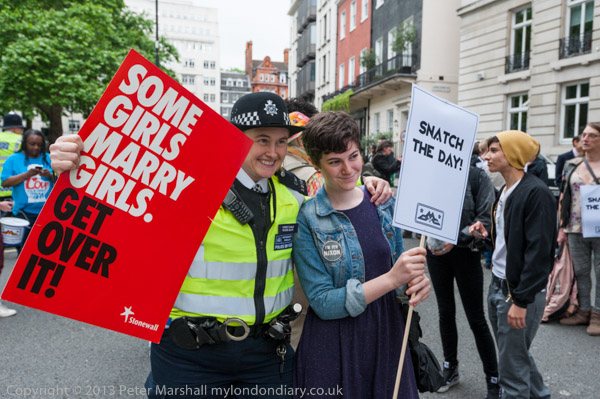
An officer policing the march poses with one of those
taking part
more pictures
The Dyke March London 2013 was a rather smaller event than last year's, which
had been the first such event for many years. Some of those involved were
determined to continue with the event, but it had got less publicity and support
- and the weather, with a little light rain from time to time didn't help.
Numbers were down from around 800 to about 300.
The route, which began in Berkeley Square perhaps also was not so suitable
- last year's event began in the rather better known Soho Square, where today's
march was to end with a rally. Berkeley Square is a little hidden away in
the middle of Mayfair and about as far as it is possible to be from the tube
in central London.
It's a shame there were not more present to hear the speakers at the opening
rally who included writer, critic, poet and deputy editor of the trans digital
magazine META who read one of her poems, and founder of the UK’s LGBT
History and long-standing LGBT activist Sue Sanders, who tested the crowd
on their knowledge of lesbian icons such as Dame Ethel Smyth, a suffragette
who was one of the better British composers of the twentieth century. I think
I did better than the average. The suffragette reference was appropriate,
as the route for the march was based in part of that for one of the suffrage
marches, although the 1908 Votes for Women march went in the opposite direction
to Hyde Park.
more pictures
ENA Meet Left Opposition
Westminster, London. Sat 22 Jun 2013
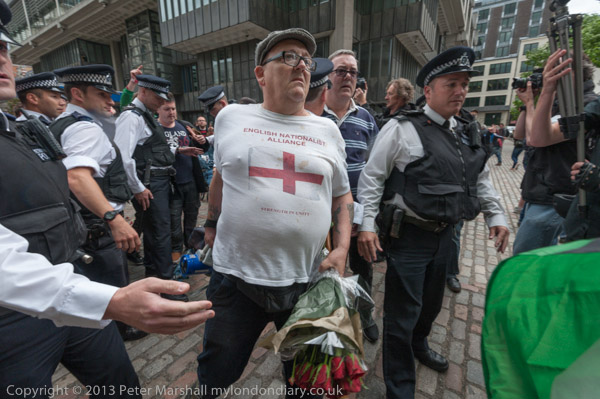
English National Alliance leader Bill Baker leads
his group away as police hold back anti-racists
more pictures
A small English National Alliance march to lay flowers at the Cenotaph and take a letter to David Cameron was harrassed as it went past the People's Assembly in Westminster. There were minor scuffles and one arrest.
The English National Alliance, one of a number of small 'patriotic' groups on the extreme right, announced their intention of marching in Westminster to take a statement of their views to Prime Minister David Cameron, on a route that took them past Methodist Central Hall where thousands were attending the People's Assembly Against Austerity.
I met up with the ENA at their meeting point outside a pub on Broadway and talked to them about some of the greivances they felt. Some complained about the unfair press they received, and in particular that some pictures of people at protests who were just waving had been captioned to say the were making Nazi salutes. But although this has happened, some people at protests by the EDL and similar groups do make Nazi salutes, and they agreed with me this was so. Accurate reporting is important, and I try hard to represent people's views (even when I disagree with them) and to report clearly - and to be critical where it is deserved.
These are people who obviously feel very strongly that Britain is and should be a British country - and British in the way it used to be before we had significant migration here from the Commonwealth and Europe. One man was very clear that he was opposed to any cultural change, and I had to disagree - so much has changed for the better in this country in my lifetime. But some things certainly have changed for the worse, although in my view for different reasons than they stated. The housing crisis is not a result of immigration but of the failure of succesive governments to invest in social housing, exacerbated by the Thatcher's right to buy policy and the subsidies to landlords through housing benefit. Education is in a mess not because our pupils now have to learn about Muslims, or that we don't teach British history (schools still do) but because of the failure of politicians to listen to those who know anything about it and a target-driven culture that mistakes better test results for better education. And so on.
A few phone calls were being made to try and find others to join the march, but eventually ENA leader Bill Baker decided it was time to march, and the group set off along Tothill St, with several photographers taking pictures and Baker carrying flowers to lay at the Cenotaph.
I was surprised when it reached Storey's Gate when it turned down there into a road with a number of small groups of left-wingers standing around outside the People's Assembly - most were at events inside the hall or in the overflow areas. Clearly even with so few of the left around there was going to be trouble, and equally clearly there were nothing like enough police to form the tight cordon around the ENA protest to keep the two groups apart. I was surprised that the police had not told the ENA marchers to keep to a more direct route along Broad Sanctuary .
The ENA marchers had only gone a few yards and some were shouting slogans including "No Surrender" when they were surrounded by people shouting at them, "Fascist scum!", "Racists!" and more and a few people tried to bar their way. Police pushed them (and me) out of the way, but some of the ENA were shouting back, and minor scuffles soon developed, with police arresting one person. One woman taking photographs told me she was hit by the stick one of the ENA was using.
Police quickly led the ENA up in front of the QEII conference centre and back onto Broad Sanctuary and on to Parliament Square, with a few counter-protesters accompanying them and shouting. They walked on to Parliament St and then stopped briefly on Whitehall at the Cenotaph to lay the bunch of flowers before going to Downing St.
I couldn't stay to accompany them into Downing St, but I was given a copy of the long statement they were taking to David Cameron, "Issued by the: Patriots of England who are suporters of every street activist and political party in the United Kingdom."
It expresses their disappointment with the coalition government and in particular its failure to meet the pre-election promises of the Tory party. They want a referendum on leaving the EU and creating closer bonds with the Commonwealth, an end to any use of Sharia law in the UK, the deportation of all radical and extremist migrants and a cap on immigration.
Perhaps surprising to some will be their call "the attacks by ATOS on our disabled, pensioners and genuine unemployed nationals should be stopped" although they also want benefits and the NHS to be limited to those who have contributed for a minimum of five years and for foreign aid to be stopped.
They say "While no racism of Xenophobia should ever be tolerated in our society, no political or social favour should be given to any political, ethnic or religious group" but they go on to say "but again we see that Islam is being appeased constantly and the fact that hundreds of so called 'British Muslims' are recruited and funded by Mosques in the UK to travel overseas and participate in Jihad and terrorist activities" and there are other questionable statements about Muslims in the letter, which in its penultimate paragraph states "while Islam promotes the political ideology of Sharia law it can never be classed as a religion to be tolerated but must and will be opposed at every opportunity by patriots of this Country."
I've tried to give a clear and accurate impression of the views, although
there are many things in the statement that I find contradictory, and most
with which I disagree. It seems to me to reflect a deeply felt disatisfaction
with changes in our society but to fail to see the real causes - largely class
and capital - and instead to blame these on immigration and immigrants, who
have enriched our society in so many ways through the ages and continue to
do so.
more pictures
Anonymous Occupy the Grass
Westminster, London. Sat 22 Jun 2013 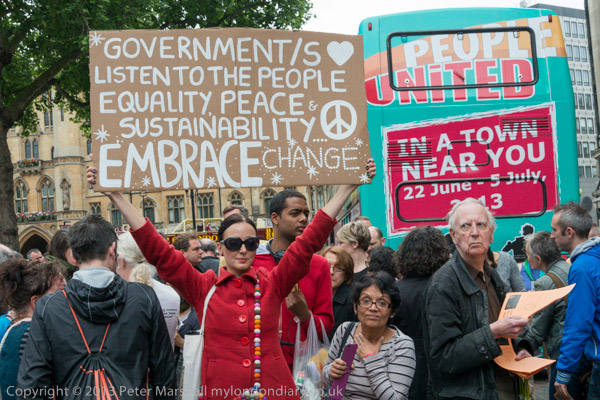
An Occupy supporter with a large poster outside the
People's Assembly in Methodist Central Hall
more pictures
Protesters from 'Anonymous' and Occupy London handed out leaflets, offered
free hugs, and had a picnic outside the People's Assembly Against Austerity.
They were among several other groups offering an alternative to the talk-shop.
more pictures
Action Not Talk?
Westminster, London. Sat 22 Jun 2013
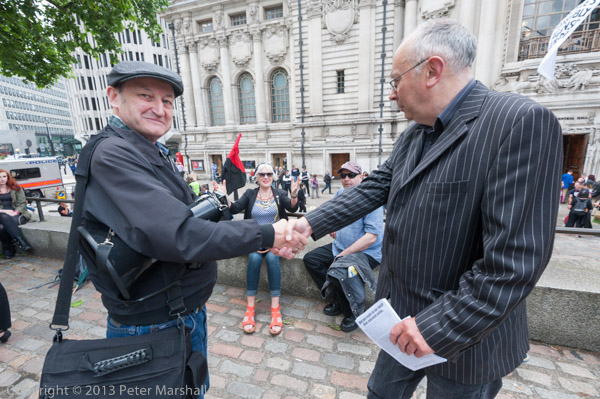 Comrade
Heath shakes hands with Comrade Bone.
Comrade
Heath shakes hands with Comrade Bone.
more pictures
Ian Bone had called for "a f**king big mob outside" (my asterisks) the People's Assembly, but the mob largely failed to turn up. Around enough for a football team. And in a questionable piece of timing his rally in the pulpit facing Methodist Central Hall started just a few minutes after the faithful had gone inside for another session of the "pointless jamboree".
So Comrades Bone and Heath and the other speakers called for an end to talk
talk, and for action on the streets following the examples of Turkey and Brazil
to a largely empty London street. Even the Anonymous masked guys from Occupy
couldn't be bothered to leave their picnic to listen, though I found it amusing.
And sad, because much of what was said was just too true.
more pictures
People's Assembly
Methodist Central Hall, Westminster, London. Sat 22 Jun 2013
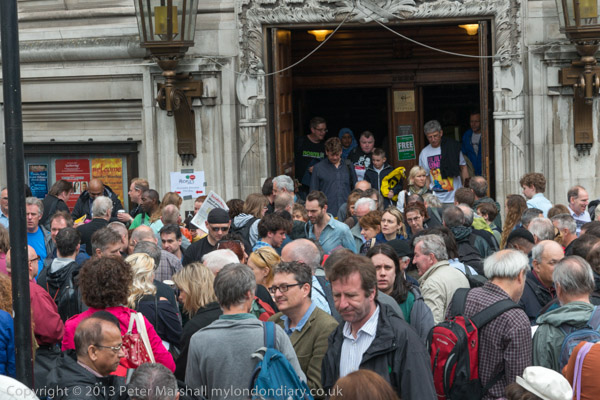
Crowds spill out of Methodist Central Hall at lunchtime
more pictures
I didn't go to the Peoples' Assembly. I rather shared the opinion voiced
on Facebook that it was a top-down event that would be used by the trade union
establishment to "disperse some of the head of steam that had built up
among the rank and file" and it reminded me of the huge 'Stop the War'
protest in Feb 2003, when leaders who were now prominent in the Assembly failed
to take any decisive action - simply calling for another (and in the event
rather smaller) protest a while after Blair had declared it was war.
It was a feeling reinforced by the statement 'We will work together with leading
experts and campaigners both here and abroad, and friendly think tanks, to
develop rapidly key policies and an alternative programme for a new anti-austerity
government', which seemed to make it clear that after the assembly it was
the long grass for any ideas, and an end to any action.
The actual event was stage managed so that any criticism of the Labour Party and trade unions was banned from the main hall - with for example Ken Loach being told there was no room for him to speak at the plenary, and being relegated, along with others not toeing the party line, to a hall down the road.
But I was there outside, and did listen to some of the speeches in the tent
in the road, as well as taking a few pictures outside. But I gave the Labour
love-in a miss.
more pictures
TUC Support for Turkish Protests
Turkish Embassy, London. Fri 21 Jun 2013
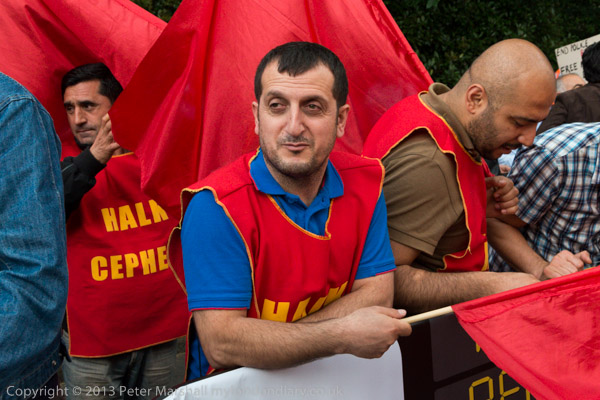
Halk Cephesi - Popular Front - members in the protest
opposite the embassy
more pictures
UK and international trade unionists joined with the London Taksim Solidarity Committee in a protest against the continuing oppression of peaceful protest in Turkey, calling for free speech and assembly and seeking a meeting with the ambassador.
Among the trade unions backing the protest were the ITF (International Transport Workers' Federation), IUF (International Union of Food workers), the TUC, UNITE, RMT, PCS and NUT. TUC General Secretary Frances O'Grady walked across the road to the embassy arm-in-arm with other trade unionists and attempted to deliver a letter to the Ambassador containing a statement making their collective feelings clear about the attempts to inhibit the freedom of speech and assembly of Turkish citizens, and the violence shown towards protestors.
Police held back the others but allowed her to go up the steps and ring the bell. She waited but no one came to answer, although there were people inside. One of the police officers came to check and told her that they were not willing to take the letter from her, and she left it in the box beside the door.
Later O'Grady spoke to the rally, giving the solidarity and support of the TUC for democratic freedoms in Turkey. She was one of a number of speakers including several from the Turkish community, but the most dramatic speech came from the RMT's Steve Hedley who gave a graphic account of being in Taksim Square when the police attached a peaceful crowd, and of the effects of the tear gas and the chemically treated water from the water cannons. Erdogan is making use of chemical weapons - if non-lethal ones - against peaceful protest.
Trade unionists are incensed at the lack of trade union rights in Turkey,
with various instances of workers being dismissed for standing up for their
rights by companies including Turkish Airlines and DHL.
more pictures
Waiting for Assange
Ecuadorian embassy, Knightsbridge, London. Sun 16 Jun 2013
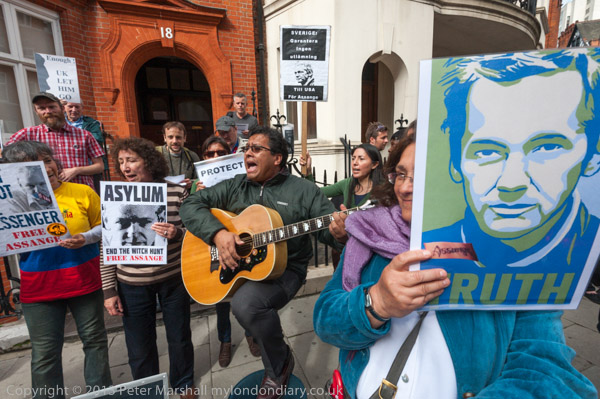
There was some entertainment from those waiting opposite the embassy, but
I still got fed up
more pictures
A small crowd of supporters waited at the Ecuadorian embassy on the Sunday before the anniversary of Julian Assange taking refuge there, waiting for him to make an appearance, and calling for the release of all whistleblowers.
Assange had been expected to come out on the embassy balcony and talk to the protesters from there after spending a year holed up in a room inside the embassy as the UK government have refused to give him free passage to travel to Ecuador. The constant police presence in case he should leave the embassy is said to have cost the UK taxpayer over £3 million so far.
The gathering outside was timed for 4pm, and when I arrived there were over 50 supporters and a similar number of press waiting for his appearance. The event had been called by Veterans for Peace UK, and they linked Assange with others 'facing persecution for exposing the true nature of war and the state', Edward Snowden and Bradley Manning.
For the supporters, Assange, Manning and Snowden are heroes who they call for them to be released rather than prosecuted. The decision of Sweden to pursue the extradition of Assange was clearly politically motivated, and it is hard to avoid the suspicion that it was made with the intention of easing his transfer to the USA. There were several at the event from Women Against Rape who stated that they do not want him to be extradited and accuse politicions of using "once again women's fury & frustration at the prevalence of rape & other violences" to advance their own purposes.
Other posters thanked Ecuador on behalf of Freedom Loving People of the world, and some Ecuadorians had those thanking President Correa for granting asylum and welcoming the visit to Londo of Ricardo Patino, as well as the message 'Ecuador Respects Freedom of Expression.'
After we had been waiting a little over half an hour for Assange, a group of protesters crossed the road from the protest pen to the embassy and each held up a letter to spell out (eventually) 'F R E E A S S A N G E'. After a few minutes a police officer came and told them politely it was time to go back behind the barriers on the other side of the road.
The South American supporters entertained with a number of songs, but there
was still no sign of Assange. The first enquiries by members of the media
had suggested he would come out at around 5pm, but as that passed we got the
information from the embassy that he was still asleep, and that it was hoped
he would show himself on the balcony at around 6pm, two hours later than expected.
I decided there was little point in my waiting and left.
more pictures
Turks continue fight
Turkish Embassy to Downing St, London. Sun 16 Jun 2013
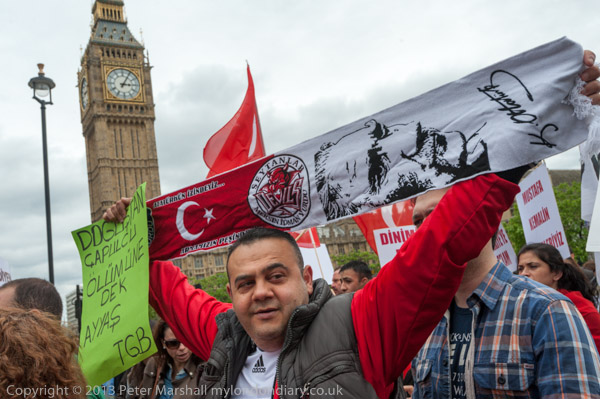
British Turks pass Parliament - and a football supporter
holds up a scarf supporting Ataturk.
more pictures
Around a thousand British Turks met opposite the London Embassy and marched to a rally opposite Downing St. Like mass rallies in Turkey today in advance of tomoroow's general strike, they called for human rights and for Erdogan to go now.
Many of the protesters carried Turkish flags, and there were placards in both Turkish and English condemning the brutal repression of peaceful protest in Gezi Park and Taksim Square, and calling for freedom of expression and for Erdogan and his ironically named Justice and Freedom Party (AKP) to go. Many also wore small pictures of either Abdullah Comert, a 22-year-old shot by police during the Gezi protests in Hatay or Ethem Sarisuluk, left brain dead after being shot by police during a demonstration in Ankara.
Before the protest moved off, there was much singing of Turkish songs, some of a clearly patriotic nature, and the shouting of slogans in Turkish which continued as the protesters marched. At times a wave of jumping up and down would spread along the length of the march. I left them as they arrived at Downing St and were beginning to make their way into the penned area opposite.
Most of the Turks marching today were keen to support the principles established by the founder of modern Turkey, Mustafa Kemal Ataturk, who established it as a secular and democratic state in the 1920s. Many feel that the actions taken by the AKP governments under which were voted into power in 2002 under Recep Tayyip Erdogan have eroded the Kemalist principles.
Erdogan's governments have eroded the secular nature of the state, imposing strict conservative Islamic views on the people and spending money on building an extra 17,000 mosques. Personal freedoms have been eroded with authoritarian measures restricting the sale of alcohol and shows of public affection. Those opposed of opposition to the government can now be accused of treason and imprisoned without evidence and court hearings can take years. The hundreds in jail include 8 MPs, various army personnel, more journalists than any other country in the world (76 in 2012), lawyers, scientists, academics, students and political activists. Many have been held without charge for 5 years.
Turkish media are highly censored and while the rest of the world was watching Taksim Square, CNN Turk showed instead a documentary on penguins - why one of the protesters today came in a penguin outfit and a few others carried toy penguins.
The recent actions against peaceful protesters have ignited a fuse that has
spread rapidly through Turkey, and today's London protest suggests that it
will not easily be stopped. Turkey's public sector trade union, the largest
union in the country, has called for a general strike on Monday 17th as a
response to the brutal clearance of Gezi Park, and other unions are expected
to follow their lead. However many in Turkey still support Erdogan, with large
sections of the community never buying in to the changes imposed by Ataturk.
The current unrest will certainly highlight the religious and political differences
in Turkey, but as yet suggest no way to resolve this.
more pictures
No Intervention in Syria
US Embassy, Grosvenor Square, London. Sat 15 Jun 2013
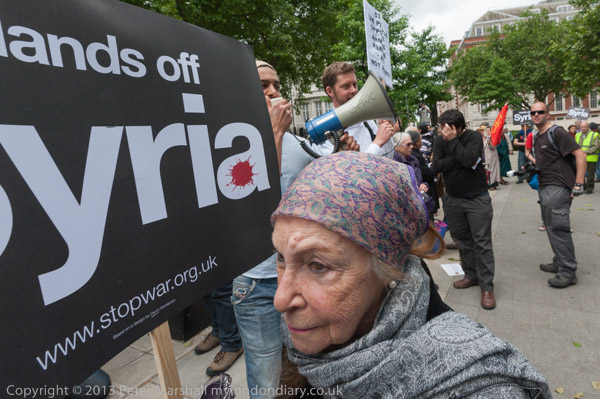
A woman walks by me with a Hands off Syria placard
more pictures
Stop the War protested outside the US Embassy against the US and UK intended intervention in the civil war in Syria, arguing that the solution cannot lie in further militarising the conflict.
Stop the War say that the intention of the UK government has been effect regime change, illegal under international law, and argue "It is for the people of the Middle East to decide their own future." As they point out, the record and history of intervention by the West in the region is a key source of its problems.
Stop the war point out that opinion polls have shown that the British public do not support any militiary intervention in Syria, and that less than a quarter of those questioned backed the giving of weapons or military supplies.
Although the US, France and UK now seem convinced that forces of the President Asad has used chemical weapons, they say that "even in the event that chemical weapons have been used" the UK government "have failed to make the case as to why arming one side would improve rather than aggravate the situation" and have urged the government to abandon their interventionist policy.
The protest outside the US embassy was poorly attended, with 'Stop the War'
appearing to have lost its ability to mobilise large numbers on the British
left, at least over the issue of Syria. It is hard to feel much if any support
for Asad, a brutal dictator who has massacred many of his own people both
in the current conflict and in the past, and who kept in power by the use
of thugs and the army.
more pictures
'Human Meat' Close Slaughterhouses
Piccadilly Circus, London. Sat 15 Jun 2013
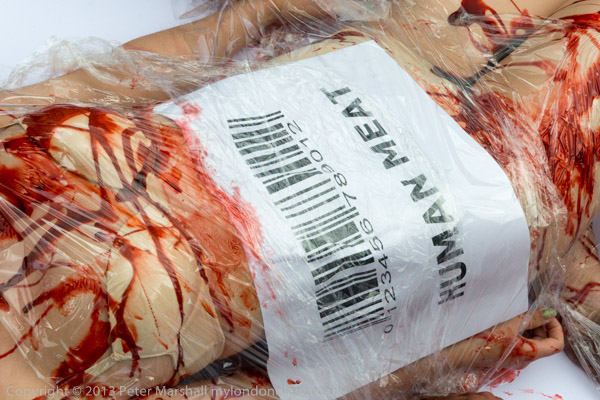
A blood-covered torso labelled and bar-coded as 'Human
Meat'
more pictures
Two women, their scantily-clad bodies covered with blood and cling-film, labelled and bar-coded as 'Human Meat' were at the centre of a protest at Piccadilly Circus to close down all slaughterhouses.
The protest organisers had been refused permission to march by police because of the Royal Trooping of the Colour in Whitehall, and were instead allowed to hold a static protest around the statue of Eros at Piccadilly Circus. Here people stood on the steps with placards and banners, while two women came and lay down on white card on the pavwement below. A man in a white plastic suit labelled 'Bastard Butcher' then drizzled fake blood liberally over their torsos before they were covered in cling film and bar coded labels with the text 'Human Meat' were added.
The protest followed a march last year to the city slaughterhouses in Paris, and was one of number of events taking place today in Paris, Istanbul, Sao Paulo, Toronto, Toulouse and Rio de Janeiro as well as London.
The protesters want a complete end to the use of animals for human food, and call for the abolition of animal and fish farming, and all fishing and hunting, as well as the selling and eating of animal products. The event web site gives four reasons for calling for the ban:
- meat production involves killing the animals that are eaten,
- their living conditions and slaughter cause them to suffer,
- eating animal products isn't necessary,
- sentient beings shouldn't be mistreated or killed unnecessarily.
After the rally the protesters intended to picket several fast-food outlets in the area and to hand out leaflet in the West End. The leaflet from Animal Aid reported on their investigations of nine randomly chosen English abattoirs, which "found evidence of cruelty, bad practice and incompetence" at eight of them, and lists some of the examples it found. Their report persuaded the leading supermarkets to insist that slaughterhouses supplying them installed CCTV cameras which - if properly used should end the illegal brutality they found, but Animal Aid argue that "they won't stop animals from suffering. Slaughter is a traumatic and horrific experience and there is no such thing as 'humane slaughter'." They urge people to adopt an animal-free diet.
Among the speakers before I left was Vanessa Hudson, the leader of 'Animals Count', "a UK political party for people and animals, established in December 2006." The party has contested elections in 2008, 2009 and 2010 and intends to have a candidate for London in the next EU elections here.
The party says that "while concern for animals is a mainstream priority, this is poorly reflected in the policies of most UK political parties. Often, animal protection ends up at the bottom of the political agenda, with politicians paying only lip service to animal welfare. Meanwhile, millions of animals continue to suffer in unacceptable conditions. Poor treatment of animals reflects badly on society and can also increase risks to human health e.g. BSE, E.coli and bird flu."
They say that supporting Animals Count will show the other parties that the
British public cares about animal issues and that this will influence the
policies and actions of whichever party wins the elections.
more pictures
'They Owe Us' G8 Protest
Canary Wharf, London. Fri 14 Jun 2013
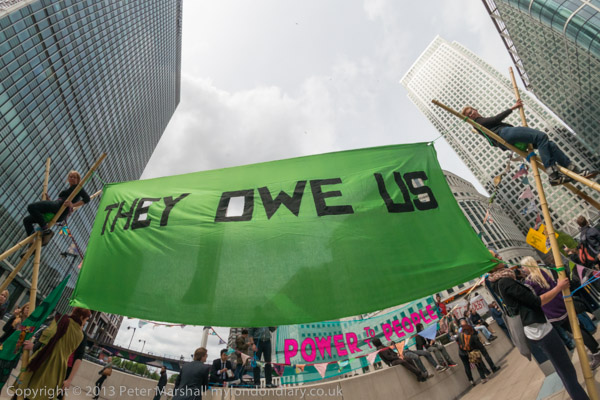
The main banner between two tripods at Canary Wharf
more pictures
The 'They Owe Us' protest in opposition to the policies of the G8 took place at Canary Wharf in a peaceful carnival atmosphere, with lectures and workshops as police and security stood around and simply watched.
The action will by activist groups including Fuel Poverty Action, UK Uncut and No Dash for Gas in opposition to the policies of the G8 was at the purpose built, highly secure environment for financial institutions that rarely sees large scale protests, and was one of a number of anti-G8 activities taking place all over the UK and Ireland from the 9th to the 18th of June.
As one protester pointed out, with placards and an inflatable pig, Canary
Wharf is in Tower Hamlets, where four in ten children grow up in poverty and
the government cuts are biting hard on poor families. But it wasn't them who
caused the crisis, but "the greed and recklessness of the financial
sector of Canary Wharf" and other parts of the City of London.
more pictures
Shaker Aamer Daily Vigil Continues
Parliament Square, London. Thu 13 Jun 2013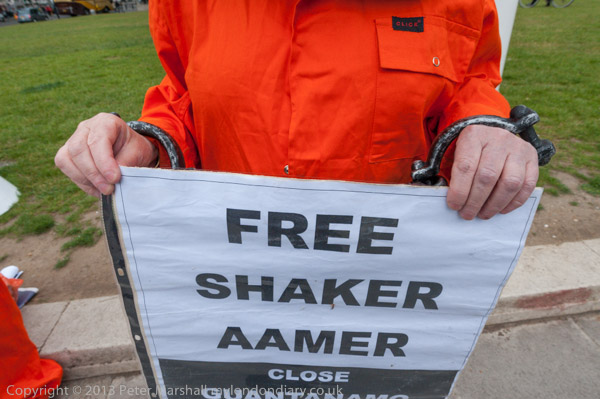
Three people had arrived for the daily three hour vigil
by the time I left
more pictures
More about this continuing vigil here
Canadian Foreign Service Protest
Parliament Square, London. Thu 13 Jun 2013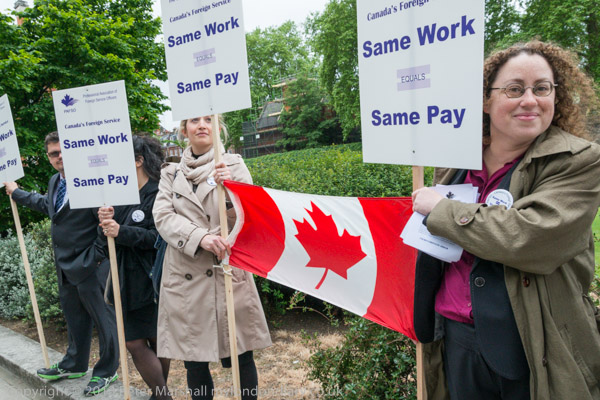
A rather different protest for the Canadian PM
more pictures
Down the road, Harper was greeted by another smaller group of protesters,
mainly in suits, from the Professional Association of Foreign Service Workers
which represents men and women working for the Canadian Government here and
around the world. They were demanding equal pay for equal work and say that
other Canadian government employees doing the exact same jobs as them are
paid up to $14,000 a year more.
more pictures
Harper, we don’t want your dirty oil!
Parliament Square, London. Thu 13 Jun 2013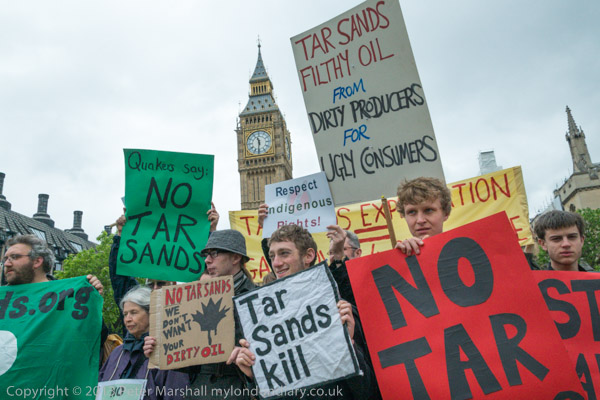
No Tar was the message for Harper at Westminster
more pictures
A noisy protest told Canadian PM Stephen Harper, invited to address Parliament, that there is huge opposition to dirty oil from Canadian tar sands that are far more environmentally and socially damaging than other oil resources.
Invitations to address Parliament are usually reserved for highly respected figures such as Aung San Suu Kyi, Nelson Mandela and the Dalai Lama. Harper has a special relationship with UK PM David Cameron, with both trying with the support of British Oil companies such as Shell and BP to force the EU to accept oil from the Albertan tar sands. Harper has been a leading advocate of the use of tar sands oil, and together they are trying to stop the EU passing climate legislation that correctly identifies these as much more carbon-intensive than conventional oil, and to discourage their import into Europe. Many environmental scientists say that to have any hope of avoiding runaway climate change, we need to leave tar sands in the ground.
In Canada, according to the campaigners, Harper "has spent the last few years promoting the destructive tar sands industry, eroding Indigenous rights, weakening environmental regulations, muzzling scientists, and helping keep the world fixed on a collision course with runaway climate change by pulling out of the Kyoto Protocol." They say his "government is currently mired in scandal and sleaze" and ask: "What was the UK thinking in extending this invitation?"
The protest was supported by leading environmental groups in the UK, including
the UK Tar Sands Network, Greenpeace UK, World Development Movement, Earth
Peoples, Campaign Against Climate Change, Healthy Planet UK,
PLATFORM, Occupy London Energy, Equity and Environment Group, Quaker Peace
and Social Witness, Lush Cosmetics, the Council of Canadians and around a
dozen other organisations.
Approaching a hundred protesters labelled Harper as a "climate criminal"
and sung and chanted in protest, with slogans including "Don't say
no thank you! Say No Tar!" and "Stephen Harper off our
soil; We don't want your dirty oil!" as the Canadian PM was addressing
Parliament.
more pictures
G8 Protest Against Arms Dealers
West End, London. Wed 12 Jun 2013
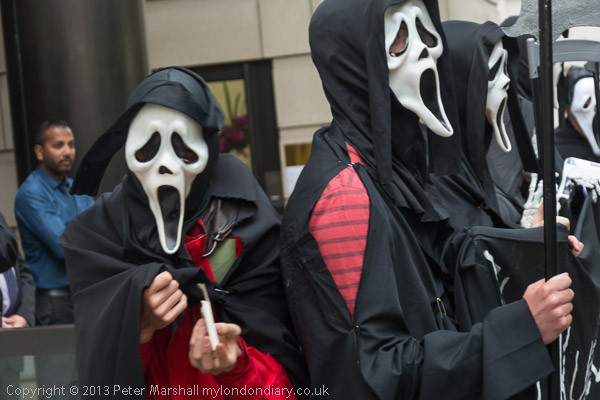
'Think we're SCARY? You'll find ARMS DEALERS INSIDE!'
outside the BAE offices in Carlton Place
more pictures
Anti-G8 protesters continued their protests with a tour of the offices of companies making armaments in Central London. Today their peaceful protest, unlike yesterday's, was not attacked by police, and there were no arrests.
Yesterday police raided the premises where many of the protesters had been staying for the week of action against the G8, tazering many of those inside, injuring a man who was trying to climb down a ladder from a roof area, and finding little evidence of intended wrong-doing, as well as carrying out wholesale searches on the streets and snatching and arresting many protesters.
After this performance which hit the headlines, the media were out in force for the second day of the week of protests, but the police simply stood back and watched as the protesters - most of whom had been taking part in the protests yesterday - demonstrated peacefully outside the offices of arms companies. There was a theatrical aspect, with a group of protesters dressed in black robes with ghost or skull masks and carrying mock scythes as well as a black banner with the message 'Think we're SCARY? You'll find 'ARMS DEALERS INSIDE'. Other banners drew attention to arms companies such as BAE and Brighton-based EDO or to the continuing Campaign Against the Arms Trade protests over the huge DSEi arms fair held in London's Docklands. Quite a few of those taking part changed into white plastic overalls suitable for what they said was a 'weapons inspection.'
The protesters started outside the offices of the UK’s largest arms manufacturer BAE in Carlton Gardens, the third largest arms company in the world and notable for several corruption cases - and they have been fined £48.7m by the US government for braking their military export laws. Here as at the other stops on the protest, there were short speeches giving some details of the immoral (and sometimes illegal) activities of the company.
From there is was only a few yards to the offices of Thales, the world's 11 largest arms company with a wide range of surveillance equipment, drones, armoured vehicles, missiles and more, before heading north to visit Lockheed Martin UK - the British arm of the world's largest arms producer, making fighters, bombs, nuclear weapons and involved with the CIA and FBI - who were also visited during yesterday's protest.
The march then led through Piccadilly Circus and on to the offices of Northrop Grumman UK, one of the world's largest defence contractors and the largest builder of naval vessels in a street close to Leicester Square. It went on through the square and down to Trafalgar Square, stopping very briefly close to the offices of missile developer MBDA on the Strand and then going on to Charing Cross Police station where those arrested for protesting yesterday were taken.
The final stop for the protest was around the corner in Chandos Place, the
offices of QinetiQ, a major defence contractor which manufactures drones and
armed robots used in Afghanistan and Iraq. I left the protest as it was ending,
and at that point there had been no arrests. The police had occasionally tried
to prevent the protesters from walking into traffic, and had asked them to
let cars through during the protest at BAE, and the protesters had done so.
As yesterday, the intention of those taking part (or at least the vast majority)
had been to have a visible and audible but peaceful protest which was a clear
statement of their views, and today the police had not interfered with this.
more pictures
Shaker Aamer Vigil Continues
Parliament Square, London. Wed 12 Jun 2013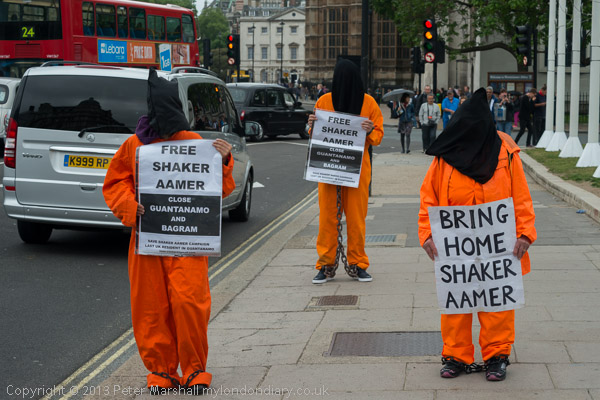
The daily vigil opposite Parliament continues - there
were four people present when I visited
more pictures
More about this continuing vigil here
J11 Carnival against Capitalism
West End, London. Tue 11 Jun 2013
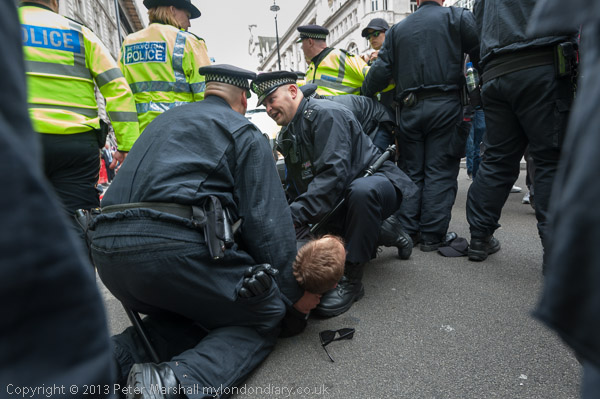
Police enjoy making a very physical arrest on Piccadilly
while others surround them to hide what is happening
more pictures
Central London was flooded by police who surrounded the squat wheremany protesters had stayed overnight and refused to let them take part, searched many people on the street and harassed those who walked around London on the protest tour. Over 30 were arrested.
The event was billed as a Carnival Against Capitalism, intended in the week before the G8 talks to point out that London is the heart of capitalism, and to expose the offices of companies they think are brutal and polluting or exploitative, financiers who are holding the world to ransom, the embassies of tyrants and the playgrounds of the mega-rich. It was meant to be "an open, inclusive, and lively event", but not necessarily one which damaged people or property.
I was surprised to find so few people at the meeting point at Piccadilly Circus when I arrived, but was soon informed that police had prevented several hundred from coming by surrounding the Beak St squat - once a police building but long empty - a couple of hours before the protest was due to start. They apparently arrived with a search warrant, on the pretext that they had been tipped off that some of those inside had paint bombs and intended to cause criminal damage. I understand little was found when they eventually searched, but they clearly came intending to arrest all those inside, with double-decker buses as well as many police vans parked in readiness on Regent St.
There appeared to be around 250 officers present, holding back people too far to see what was happening and blocking the side streets, with others wandering all of the streets in the area. From the small press area I could hardly see the building, and getting decent pictures even with a very long lens was impossible.
A Section 60 order had been obtained for the whole of the cities of both London and Westminster, and police seemed to be stopping almost anyone dressed in black or otherwise looking as if they might be a protester. Many were simply searched, but I saw some being handcuffed and led away. One woman who I didn't photograph was arrested and put in a police van on Regent St for having a marker pen in her handbag.
Having been unable to work to any effect in Beak St, I returned to Piccadilly Circus just as the group of protesters there - who had grown to a couple of hundred and now included a samba band - began to make their way on their intended tour of the offices of some of the most powerful and greedy - oil and mining giants, arms dealers, vulture funds, companies that launder blood money, invest in war and speculate on food supplies, and the offices, embassies of tyrants.
During the tour there were a few scuffles with police, mainly started by police grabbing individuals from the crowd, when they and others fought back, and more arrests were made. I saw no attacks on property and no unprovoked violence by the protesters. Piccadilly was blocked for some time as police stopped the protesters there. The band played, then there was an open mike and a few people spoke. Piccadilly didn't fully reopen to traffic for over an hour after the protesters had left as it was still blocked by police vans. The protesters then moved on to Regent St, and there were a few more short speeches and a little music and dancing. Eventually the tour continued, moving down to Lower Regent St where the band stopped outside the offices of armaments manufacturer Lockheed Martin - best-known as the makers of the Trident missiles.
Here an officer in the light blue jerkin of Liason Officers came to tell the band that they needed a licence from Westminster Council to play music in the street and would be committing an offence if they continued to play. He was greeted by shouts of derision from the crowd, but the band were clearly worried and held a consultation before deciding to continue on to protest outside BP around the corner in St James's Square.
I left the protesters here, still accompanied by a large number of police.
The protest had appeared to be without real incident, and hadm, despite the
huge police presence, followed (if only in part due to the police interventions)
the intention stated by organisers, 'StopG8': "On #J11 we will party
in the streets, point out the hiding places of power, and take back the heart
of our city for a day."
more pictures
Lobby Urges 'Save Workers Lives'
Westminster,London. Tue 11 Jun 2013
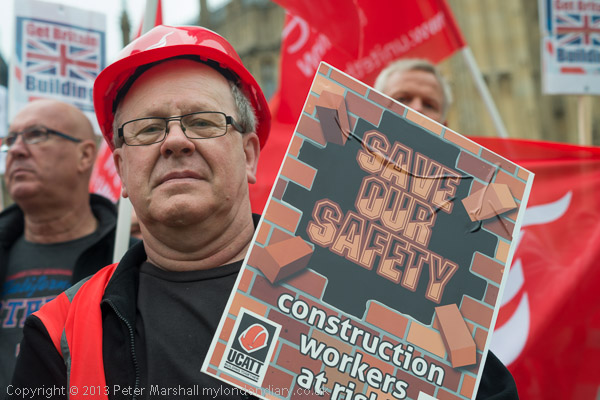
'Save our Safety' - construction workers lives are being put at risk as the
government sabotages safety
more pictures
UCATT and Unite unions, along with the Construction Safety Campaign and Families Against Corporate Killers (FACK) organised a lobby of Parliament today against the government's dismantling of the fundamental human right to safe and healthy work, which will result in more deaths as they cut down on regulations and on safety inspections.
Linda Whelan, one of the founder members of FACK issued a statement:
"Don’t be fooled by government lies on health and safety, it isn’t a joke and isn’t a burden, an albatross or a millstone round employers necks, but lack of it is a massive burden on all of us!
By cutting health and safety regulations, inspections and inspectors, the government is putting the lives and safety of so many workers at risk. This is true not only in construction but also in workplaces that they have wrongly classified as ‘low risk’ such as quarries, farming, docks, the whole of the manufacturing sector, road and air transport, the public sector and more! FACK knows that health and safety isn’t a joke, it’s about life and death. But many people do not realise that, until someone they love goes to work and never comes home. People aren’t killed because of too much regulation and enforcement, but because of not enough! The only people who benefit from removing laws and scrutiny are unscrupulous employers. Employers will not necessarily look after workers health, safety and welfare unless the law says they have to, and inspectors check-up to make sure they do. Many people laugh about health and safety and think getting rid of it will be good for us all. This is not true. We want the public and MPs to learn from our bitter experience that health and safety is not meaningless red tape but a vital safety net that protects all the people you love at work. We don’t want you crying later when it’s gone.
“Deaths at work will only increase if we let Cameron get away with trashing health and safety. Instead of cuts to the regulation, enforcement and inspection system, the government should value and respecting workers and strengthening their protection at work. The government is lying about the burden on business, lack of health and safety is a massive burden on us, in heartache and lifelong loss, but it also cost the public purse far more than good health and safety does."
Before the lobby, the unions staged a photocall on College Green where I
took pictures. Far too many people, particularly in the construction industry,
still die at work, and almost every fatality could have been avoided if safety
regulations were adhered to by the employers. Today's lobby came shortly after
shocking revelations about the illegal blacklisting of workers by construction
companies in many cases simply becuase they complained that safety regulations
were not being adhered to.
more pictures
World Naked Bike Ride
Marble Arch & Westminster, London. Sat 8 Jun 2013
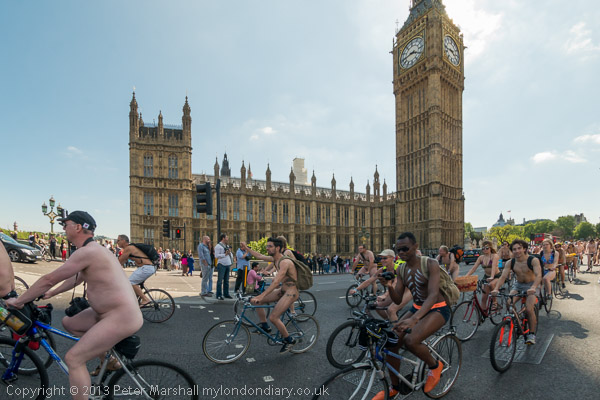
A few of the cyclists at the Houses of Parliament
more pictures (includes
some nudity - don't view these if they might offend you!)
Cyclists from four starting points converged on Westminster for the London World Naked Bike Ride around the city, an annual protest against oil dependency and a demonstration of the vulnerability of cyclists in traffic.
The cyclists came from four starting points, Marble Arch, West Norwood, Clapham Junction and near Kings Cross, their routes converging on Westminster, from where they went on to ride to St Pauls and back through Holborn and Trafalgar Square to Hyde Park Corner.
I went to watch the start from Marble Arch, where they gathered on the grass area next to the hard standing. At 2.30pm people began to remove their clothes, although not all the riders rode completely naked. The event advice is that people should ride 'as bare as they dare' and only the wearing of footwear is compulsory for safety reasons.
Soon there were a remarkable variety of bodies on display, some with body paint or slogans, as well as a large crowd of people - mainly men - with cameras, phones and tablets photographing them. As the cyclists moved towards the start it was almost blocked by the crowds, but the real problem in getting the hundred or two bikes on the road was the traffic at Marble Arch - it would hardly have been possible to choose a worse location to join the road than cycling through the narrow arch into heavy traffic.
Later I rejoined the cyclists on Westminster Bridge, where all four groups came together, so many it was impossible to count. The group from Marble Arch arrived a few minutes after the rest had left.
The event causes considerable interest, with crowds of tourists stopping
to watch and to photograph, and although everyone around me seemed to be greatly
amused, there seems to be little or no appreciation of the reasons behind
the protest.
more pictures (includes
some nudity - don't view these if they might offend you!)
Big IF Solidarity Walk
Westminster to Hyde Park, London. Sat 8 Jun 2013
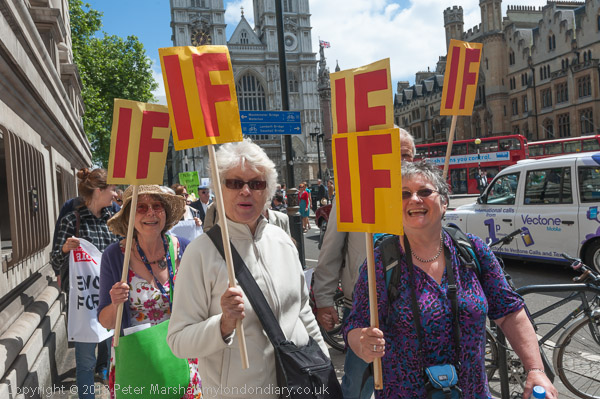
Big IF campaigners walk to show solidarity with the
hungry
more pictures
Thousands of campaigners walked from Westminster to Hyde Park in solidarity with the one in eight people around the world who go hungry and to demand that the G8 world leaders tackle the root causes of global hunger.
The starting point for the 'Big IF' events is that "The world produces enough food for everyone, but more than two million children die every year because they can’t get enough to eat." The problem isn't with producing the food, but the unfair distribution of wealth and power which means many of those who need food don't get it, while others have more they can eat.
Things are getting worse as the rich and powerful people and corporations use that power to get richer, with land grabs in many countries depriving people of land they have traditionally farmed and turning it over to large scale agriculature to grow crops for export or for biofuels, and with companies and the rich taking advantages of tax dodges, particularly in depriving poorer countries of revenues they need for programmes to fight poverty and hunger. The campaign also stressed the need to improve the transparency, accountability and governance of key aspects of the food system.
So far the G8's proposals under their 'new alliance for food security and nutrition' adopted last year are structured to make profits for the large agribusiness coprorations and will mean ruin for many small farmers. Almost 200 African groups signed a Statement By Civil Society In Africa which condemned the proposals, describing them as "a new wave of colonialism", pointing out that they work to the benefit of the corporations and not for Africa.
The Big IF took place on the same day as David Cameron's Hunger Summit and was supported by a wide range of organisations, including Christian Aid, Oxfam, Cafod, Save the Children and many more. Some of the supporters started a day of protest by attending an IF service at Westminster Central Hall, which was packed to overflowing, and some others gathered in Parliament Square and outside Westminster Abbey for what was described as "a walk through central London from Westminster to Hyde Park in solidarity with the one in eight people around the world who go hungry."
People started on the walk before I arrived, and around half an hour earlier
than planned. This was a walk rather than a march and it kept to the pavement
and took a rather devious route along some side-streets to get to Hyde Park,
stopping for traffic lights and to cross roads, so it was very split up, with
people coming in dribs and drabs. I probably saw around 5,000 people before
I left to photograph a rather smaller group of walkers coming to Hyde Park
from the north, who I met at Marble Arch. I didn't go on to the rally which
was said to have around 40,000 people present.
more pictures
Food Sovereignty not Food Security
Unilever House, Blackfriars, London. Sat 8 Jun 2013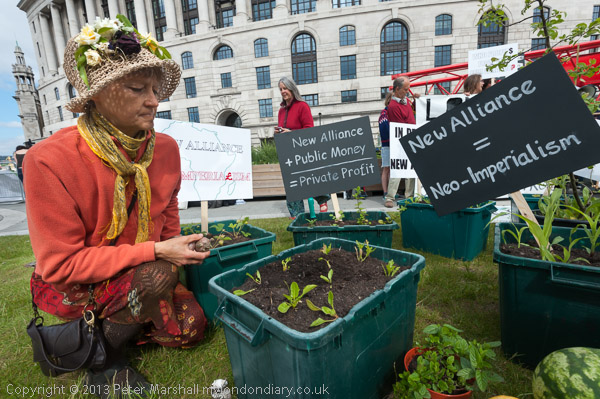
Planting potatoes outside Unilver House
more pictures
Activists outside the Unilever offices where David Cameron was addressing his 'Hunger Summit' denounced the G8's 'New Alliance on Food Security' as a corporate takeover of world food production which will be a disaster for Africa and its farmers.
The 'Summit on Hunger' where David Cameron addressed carefully picked delegates this morning ahead of the G8 Summit and made some strong pledges on child nutrition is overshadowed by the G8's special initiative launched in 2012, the 'new alliance for food security and nutrition.' Appropriately the meeting was held not in a government building but in Unilever's iconic London offices overlooking the Thames at Blackfriars, as Unilever, along with other global agribusinesses such as Monsanto and Cargill are the major beneficiaries of the 'new alliance.'
The G8 initiative will plough billions of dollars into financing the expansion of these companies businesses in Africa, at the expense of existing land owners and farmers. Countries which opt to take part will be require to sign agreements that allow land grabs by the giant corporations and replace traditional plants and seed with GM and other high-tech seeds and supplies, in what had been dubbed 'structural adjustment 2.0'.
The process will marginalise small African farmers, driving them from their traditionally owned land, increasing unemployment and the movement to cities. Probably - as in India - many will be driven to suicide as their only solution. Agricultural output may - at least in the short term - increase, but most of it will be food for export or biofuels, and hunger will increase - along with the profits of the mega-corporations. Almost certainly all these technological fixes will in the long term fail, leading to further desertification.
African farmers don't want this kind of support, which will too clearly lead to their ruin. They need support that increases their economic, social and cultural resilience, methods to increase their productivity through simple low-tech improvements in land use, that preserve and improve the soil, and increase water retention, that improve traditional crop varieties by proven old-fashioned methods. Various projects have shown how this can be done - but none increase the profits of agribusiness and they are neglected by the kind of development programmes advanced by the G8.
Almost 200 African groups signed a Statement By Civil Society In Africa which condemned the proposals, describing them as "a new wave of colonialism", pointing out that they work to the benefit of the corporations and not for Africa. They called for the G8 and other institutions to:
- Acknowledge variation amongst farmers and commit to providing appropriate, dedicated support to all food producers rather than only a thin commercial layer;
- Abandon efforts to assert private ownership of germplasm, agricultural techniques and knowledge and to accept that these all emerge from a common pool
- Invest in and facilitate open source technological development together with farmers;
- Invest in ecological agriculture following the IAASTD (International Assessment of Agricultural Knowledge, Science and Technology for Development) proposals;
- Development finance to be based on grants and public programmes not for profit;
- Ensure smallholder women and men farmers are at the centre of any strategy for increasing investment in this sector.
Environmental groups including Friends of the Earth and campaigning group War On Want who organised this morning's protest reject the 'New Alliance' and there is now a UK Food Sovereignty movement which "puts the people who produce, distribute and consume food at the centre of decisions on food systems and policies, rather than the demands of markets and corporations that they believe have come to dominate the global food systems.'
The protesters had brought with them a number of containers with plants growing
in them, as well as already harvested produce to create a small 'garden' in
the road island opposite the main doorway to Unilever House, and I watched
them planting out a few more plants, as well as holding up placards and banners
and chanting slogans. It was a peaceful and 'family-friendly' protest.
more pictures
Outrage outside G4S AGM
Fore St, City, London. Thur 6 Jun 2013
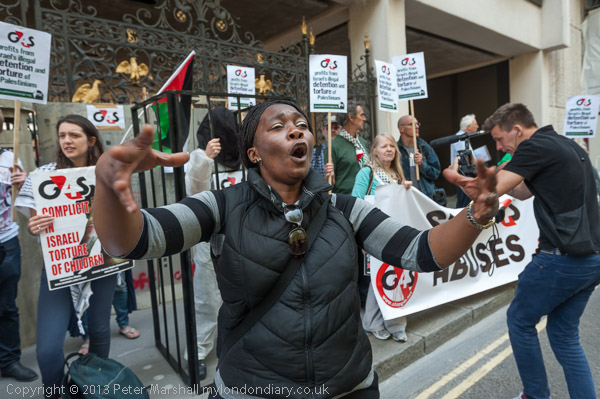 Protesters
outside Salters Hall where the AGM was taking place
Protesters
outside Salters Hall where the AGM was taking place
more pictures
A protest outside the G4S AGM drew attention to the outrage felt by many at its activities profiting from Israel's repression of Palestinians and the mistreatment of asylum seekers, putting profits before human rights and human dignity.
A man in a hooded suit stood in a cage, in front of a mock Israeli apartheid wall, pointing out the company's involvement in Israeli prisons. Others among the protesters held placards and banners about this and about the death of Jimmy Mubenga in the 'care' of G4S security guards when being deported on a flight out of Heathrow. They were still keeping up a noisy protest when I left a couple of hours after the start of the event, as share-holders arrived and walked past them to enter the company's AGM.
Although the company say they do not have contracts involving the total operation, according to Trine Christensen of Amnesty International: "It is worrying that G4S has chosen only to pull out of one Israeli prison on the West Bank and not from the Ktziot, Megiddo and Damon prisons in Israel, all of which contain Palestinian prisoners", pointing out that holding the Palestinians in Israel violates the Geneva convention and that many of them have received administrative imprisonment without having been sentenced.
Ruth Hopkins of the Wits Justice Project (WJP)recenly reported in The Guardian that a confidential South African government report had stated that G4S "is illegally holding inmates in isolation for up to three years and denying them life-saving medication"; the report details 62 who were detained in solitary confinement against prison rules for between two weeks and three years, two of whom were not allowed essential TB and HIV medication. A recent prison visit by the WJP suggests the practice is continuing.
G4S is best known in the UK for its failure to deliver its contract over Olympic security last year, but the inquest is currently proceeding on Angolan refugree Jimmy Mubenga, who died after being restrained by G4S security guards when being forcibly returned to Angola on 12 October 2010. Mubenga, a 46 year old man in good health who had lived in this country since 1994 and had a wife and five children here, was heard begging for help around 50 times by other passengers on the plane before he suddenly went silent. The three guards were later arrested, but scandalously the Crown Prosecution Service decided there was insufficient evidence to take a case against them to court. The inquest which started in late May is expected to last around 8 weeks, with around a hundred witnesses being called. G4S are also facing a UK parliamentary inquiry into their disastrous handling of an asylum housing contract.
Protesters outside the G4S Annual General Meeting at Salters Hall on the
edge of the Barbican were in no doubt about what happened. "Who killed
Jimmy Mubenga?" was answered by a resounding "G4S killed
Jimmy Mubenga", and shareholders attending could not have failed
to hear it from the street outside, where protesters stood on both sides of
the road with placards and banners. As well as the prisoner in the cage, there
was also someone dressed as a G4S security guard. Many of the protesters waved
Palestinian flags, and those entering the meeting were offered a letter detailing
and criticising the involvement of the company in the illegal occupation of
Palestine and the torture of children and other human rights abuses in Israel,
asking them to raise these concerns at the AGM, and to work on other stakeholders
to get the company to fully divest from Israel.
more pictures
Brian Griffin Book Launch
Horse Hospital, London. Wed 5 Jun 2013
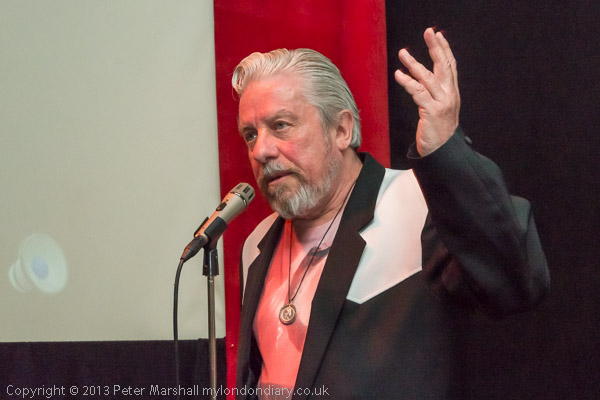
Brian giving his presentation
more pictures
You can read more about the event on >Re:PHOTO in The Black Kingdom. Great book - buy it!
London University Security Guards
Senate House, London. Wed 5 Jun 2013
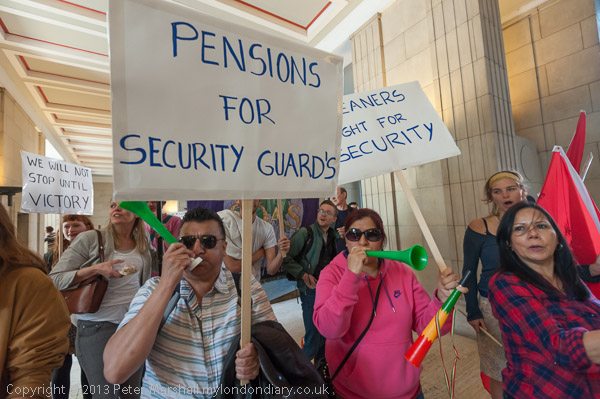 Cleaners
and students and others protest noisily on behalf of the University security
guards
Cleaners
and students and others protest noisily on behalf of the University security
guards
more pictures
A lively protest at Senate House called for London University's low paid security guards to be given proper pensions, sick pay and holiday pay in line with colleagues employed directly by the university, and for an end to the outsourcing of jobs.
It is truly amazing just how much noice around 30 students, low-paid workers and trade union activists can make with a few drums, a megaphone and their voices, even without the plastic horns which are usually a feature of the protests by the IWGB (Independent Workers Union of Great Britain) but which today only arrived at the last minute, just as the protest was about to end.
Today's action at the Senate House was part of a 'Summer of Action' called by the University of London Students' Union, the IWGB and '3 Cosas' campaign, to step up the pressure on the University of London to ensure that all the low paid workers there have proper rights - decent conditions at work with proper pensions, sick pay and holiday pay. They want them all to have similar rights to those enjoyed by administrative staff directly employed by the University.
The poor treatment they currently suffer is a result of them not being employed by the university where they workm but by contractors who supply services on the cheap - by paying low wage rates and cutting down workers' rights to the legal bone (or sometimes even less.)
The workers want equal treatment and many students or staff have recognised
the justice of their case - and some came to take part in the protest. Many
of the low-paid out-sourced workers have now followed the example of the cleaners
and have joined the IWGB, a small independent industrial union that has proved
very effective in getting its members the London Living Wage by protests such
as this to shame employers and back up their hard bargaining. Previous protests
supported by the cleaners acheived the London Living Wage in July 2012. Most
of the low paid workers were then in a Unison branch which includes directly
employed workers, but found that they could not get the Unison officials to
support them in campaigning against the university, and to stop them effectively
organising their campaigns the union officials handed over the running of
the branch to the London regional office and declared the branch elections
which had elected outsourced workers invalid.
The primary aim of today's protest was to support the university's Security
Guards (outsourced to Balfour Beatty) in their fight for proper conditions.
Most of them are now in the IWGB, but were unable to take part in the protest
because of the long hours during the working day when they are on duty. Several
of them were on duty at the Senate House as the protest took place, standing
in front of it and guarding the door to the buildings. A couple of the placards
carried in the protest were in Polish, as one of the guards on duty was Polish.
Security Guards are vital to the smooth and safe running of the university, working 12-hour shifts including nights, and ensuring security and safety, as well as carrying out administrative tasks such as filing mail and acting as receptionists, along with dealing with sometimes rowdy students and intruders. They feel the university owes them a duty of care, and it should feel responsible for the lies they have been told about wage increses, and the lack of pensions, sick pay and holiday entitlements.
The campaign also hopes to persuade parts at least of the university to take all their workers back onto the university payroll, with a particularly strong campaign being waged at SOAS (the University of London School of Oriental and African Studies) because of its global committments for justice to bring all workers back "in-house" with the slogan 'One Workplace, One Workforce!'
The protest gathered in the courtyard next to Senate House and then moved
into the open area beneath the building directly in front of the main entrance.
They they waved union flags, held up placards, chanted and kept up a continual
barrage of noise for around an hour - broken only by a few short speeches
about why they were protesting. During this time they kept a passageway open
so that people could enter and leave the building or walk through the area.
At the end one one of the organisers thanked everyone for coming and left
a clear message that unless their demands were met there would be further
protests in the Summer of Action.
more pictures
For and against Gay Marriage
Old Palace Yard, Westminster, London. Tue 4 Jun 2013
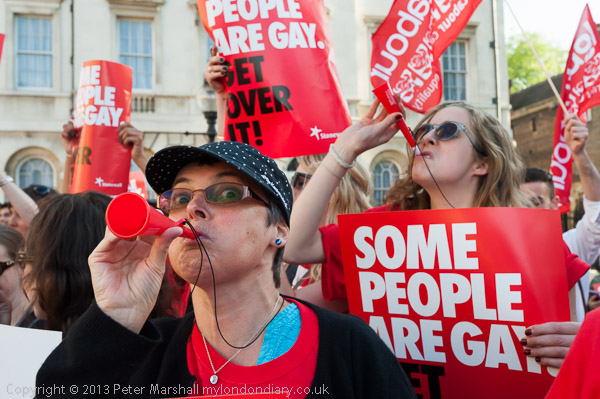
Stonewall had organised a protest in support of the gay marriage bill
more pictures
Supporters of gay marriage and Christian groups opposed to it both held protests opposite the House of Lords where peers were debating attempts to wreck the bill.
Next to the large group of protesters with Stonewall posters were a similar sized group organised by 'Christian Concern' who prayed and sang, murdering 'Amazing Grace' several times while I was there. At there centre were a black couple dressed as a bride and groom standing on a base resembling a wedding cake.
There was also another small group of Christian extremists who had been at Westminster since I arrived at lunchtime, some of them moving around the area with posters of very large print Bible texts, and others standing still and preaching, though there seemed to be nobody listening to their amplified sermonising.
Along with the mass of Stonewall protesters, Peter Tatchell and a few others
held posters from his foundation, and several people, including one man in
drag waved rainbow flags. The pro-gay protesters made rather more noise, blowing
horns and shouting slogans, but the groups kept apart. One woman from 'Christian
Concern' did come and begin to tell some of the LGBT protesters that she was
praying for them, but another person from 'Christian Concern' quickly came
to pull her away.
I left as the protesters were waiting to hear the result of the division on
the wrecking amendment, which was lost by a large majority, bringing gay marriages
a step closer.
more pictures
Save Legal Aid & British Justice
Ministry of Justice, Petty France, London. Tue 4 Jun 2013
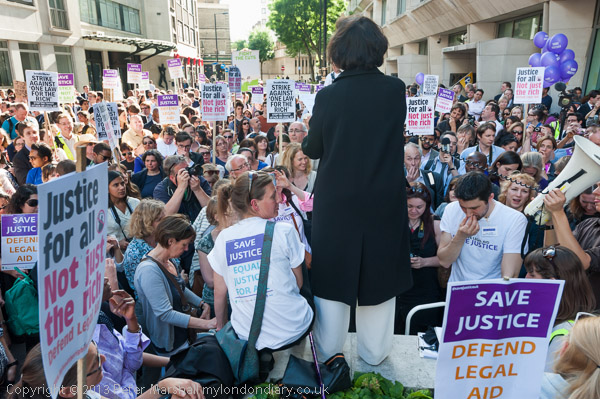
Among the many, many speakers was Bianca Jagger
more pictures
A large crowd of lawyers and other campaigners for justice filled the road outside the Ministry of Justice in a lengthy protest against the proposed changes. By the time I left there were probably around a thousand there, blocking the street.
As speakers pointed out, the changes threaten the very heart of our legal system, severely weakening the ability of those who are not rich to get justice. Instead of being able to chose lawyers with relevant expertise, defendants will be assigned them from the company that has made the cheapest bid for the area. Large companies with little legal connection including Eddie Stobart and Tesco are expected to bid for the work, putting the many small specialist law firms which currently exist out of business.
The protest took place today as the government 'consultation' on the changes came to a close. This is not a real consultation, and regulations bringing in the changes will come into effect within 3 months, without any pilot scheme, without an debate in the Houses of Parliament and with no proper examination of the evidence.
As at least one speaker pointed out, the whole process shows a basic lack of competence in the current government, pushing through changes with no real idea or care of what the consequences will be.
Among the speakers were several QCs, including Dinah Rose, Geoffrey Robertson
and Michael Fordham, representatives of human rights organisations and charities,
MPs David Lammy and shadow justice minister, Andy Slaughter and Bianca Jagger.
more pictures
Stop Deporting Lesbians to Uganda
Home Office, Marsham St, London. Tue 4 Jun 2013
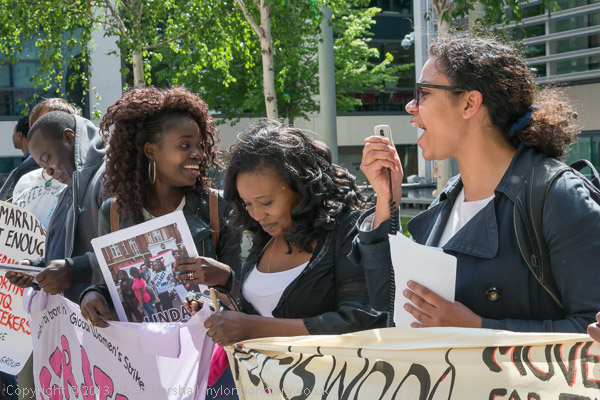
Protesters with posters and banners chant slogans outside
the Home Office
more pictures
A protest at the Home Office called for an end to deportations to Uganda of known lesbians who face death if returned there. Uganda is not safe for any LGBT person as Jackie Nanyonjo's death in March showed and protesters urged that Linda N and Josephine must not be deported.
Around 20 protesters from Queer Strike (part of the Global Women's Strike movement) and the Movement for Justice protested this afternoon against the deportations of gay asylum seekers to countries such as Uganda, where gays are persecuted and even killed. The protest came after lesbian Jackie Nanyonjo died following injuries inflicted on her during her forced deportation by thugs contracted to the UKBA in March, and a day before flights are due to return Linda N on Qatar Airways and Josephine by Royal Air Maroc.
One other detainee who was returned to Uganda, May K, is still in hiding, fearing for her death, but the Home Office - who have now taken over from the discredited UKBA is still intending to return Linda N and Josephine to persecution and probable death.
An inquiry has been set up by MPs into the Asylum process, but the racist character of the UKBA appeats to be being continued by the Home Office. Linda N, a known lesbian activist and member of the Movement for Justice was dealt with under a 'fast track' procedure designed to prevent proper consideration of cases, and despite a great deal of evidence was told she had not done enough to prove that she was gay. Josephine, a woman aged 62 with family in the UK, came here for sanctuary after refusing to carry out female genital mutilation (FGM). If returned she will be subjected to punishment beatings for her refusal and possibly killed.
The protests chanted slogans calling for the release of these women and for
all the detainees in Yarl's Wood, and an end to racist immigration practices.
They also called for an end to deportation to other unsafe countries including
Afghanistan.
more pictures
Bring Shaker Aamer Home Vigil
Parliament Square, London. Tue 4 Jun 2013
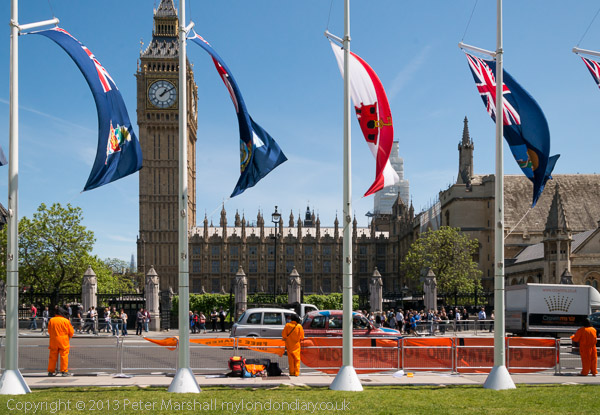
The protest is continuing every day Parliament is
in session
more pictures
The Save Shaker Aamer Campaign is carrying out a continuing daily symbolic presence opposite Parliament from 12-3pm on every day Parliament is in session until July 18. There were three protesters today, all in black hood and orange jumpsuit, and one wearing 'chains' around hands and feet. There were some handy barriers (there for some royal occasion) on which they hung their banners.
The daily vigil intends to remind Obama to close Guantanamo and release Shaker, to prompt the UK Government to demand Shaker's immediate return to the UK, and show solidarity with the Guantanamo Hunger strikers.
Their lives are now in extreme danger as the hunger strike continues with over 40 of more than a hundred taking part now being forcibly fed, including 'prisoner 239', Shaker Aamer from Battersea.
I didn't take many pictures and was on my way to another protest. I hope
to visit the daily vigil on further occasions. A debate in the UK Parliament
is expected to take place soon.
more pictures
Anti-Fascists Stop BNP Wreath Laying
Parliament Square, Westminster, London. Sat 1 Jun 2013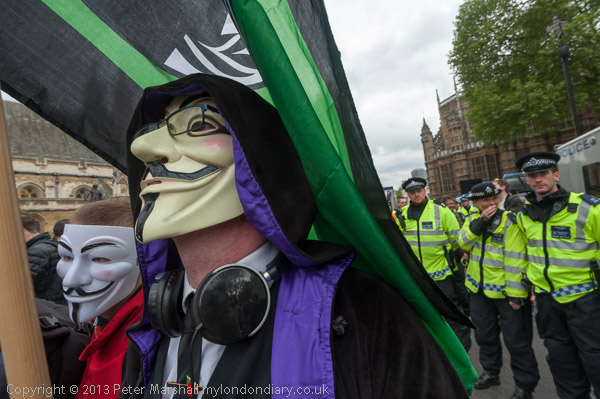
Anonymous were there along with Antifa, trade unionist and the UAF to oppose
the BNP hate
more pictures
Anti-fascists including members of Unite Against Facism and many other groups and individuals massed in Parliament Square stopping far-right BNP members led by Nick Griffin from marching to lay a wreath at the Cenotaph for Woolwich victim Lee Rigby whose father had earlier called for calm and for people not to use his name to attack others.
When I arrived outside Parliament I saw a large crowd of anti-fascist protesters blocking the street towards Old Palace Yard where the BNP were holding a protest. I walked past them and through the several lines of police and parked vans to photograph the few BNP supporters, standing around, mainly looking rather fed up while their leader Nick Griffin, who had also arrived late, having joined his few supporters when he was sure it was safe, answered questions from the media who outnumbered them, before going back to photograph the anti-fascist protest.
As I returned, police were bringing a steady stream of protesters back under arrest to fill a couple of double-decker buses they had standing ready. Later after I walked through the police lines I saw a few incidents which led to arrests; one man was grabbed in a rush into the crowd after shouting comments the police found offensive, and later another man wearing an 'Anonymous' mask who went up to talk to the police got rather cheeky and was dragged away.
The protesters at the front had linked arms to resist police charges, and there was a great deal of chanting of slogans against the BNP and their racist policies, but most of the protesters were simply standing on the road holding their banners and placards, making no attempt to break through the police lines. The protesters were bouyed up by seeing the small size of the BNP protest, chanting "There are many many more of us than you" along with "We are black, white and Asian and we’re Jews." Police announcements told the protesters that their protest was illegal and that they could be arrested, but they stood their ground. As usual, some of the police announcements were in any case inaudible to many standing there - or sitting in their wheelchairs - but the protesters were determined to stop the BNP whether or not they might be arrested.
I'd missed the start of the protest through attending a memorial service for an old friend, and it had started several hours earlier with around a thousand protesters determined to block the BNP route. They were joined by some of those who had earlier marched against the badger cull, many of whom were still protesting in Parliament Square, where some were playing music and dancing - and they brought a new slogan "Cull the BNP, Not the badgers!"
After the batch of arrests at around half past three to fill their buses, police tactics seemed to change, perhaps because they realised that arresting everyone present (and the paperwork involved) was impracticable, and things settled down to a stand-off with a few yards of empty space between the several-deep line of police and the crowd of protesters. Relations between police and protesters became more friendly as they cooperated in letting the many tourists walk along the pavement in front of Parliament past the protests.
As little seemed to be happening I walked up to the Cenotaph along a virtually empty Whitehall - most of the traffic had been diverted. Apart from the ongoing Sikh vigil against the hanging of Professor Bhullar - now there for around six weeks - there were no protests. The Cenotaph is being renovated ready for the Second World War anniversary celebrations, with wreaths instead being laid on a triangle of makeshift frames - and a couple of people without ceremony added flowers and a Union flag as I watched.
I walked back to Parliament Square, and shortly afterwards the police officers
told us that the BNP had left, and a few minutes later the police dropped
back and the protesters surged forwards following them towards the now empty
Old Palace Yard. I was about to leave when I was told that there would be
a march to a brief rally at the Cenotaph by the anti-fascists to celebrate
their success, and I walked back to photograph them as they arrived and the
brief speech there thanking everyone for their support.
more pictures
BNP Stopped From Exploiting Woolwich Killing
Old Palace Yard, Westminster, London. Sat 1 Jun 2013
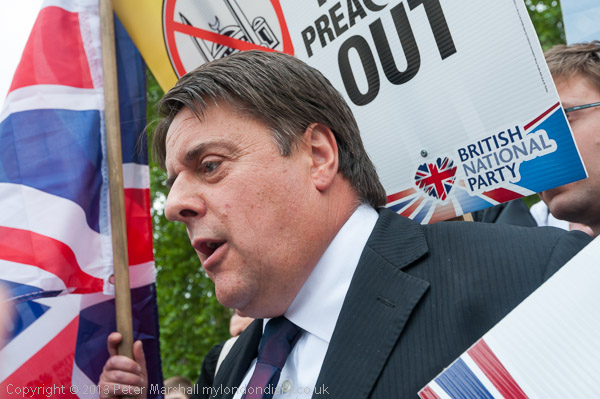
Nick Griffin answers questions under a placard 'Hate
Preachers Out' and fails to appreciate the irony
more pictures
Nick Griffin and a small group of BNP protesters were prevented from laying flowers at the Cenotaph to gain publicity by exploiting the killing of Lee Rigby by a large anti-fascist protest. Protected by hundreds of police for well over 3 hours they then left.
One could almost feel sorry for Nick Griffin, surrounded by a mob of press with largely hostile questions, more or less deserted by party members in a rather lonely protest opposite Parliament, though any sympathy I might have felt was immediately dispelled by the lies, half-truths and distortion in his answers. The BNP leader had hoped for a mass protest in Woolwich, capitalising on the killing there of soldier Lee Rigby, making use of his senseless slaughter there to gain support for his anti-Muslim rhetoric, but instead the Westminster protest was a humiliating failure.
The police sensibly banned his Woolwich to Lewisham march as it would have been impossible for them to guarantee public (and his) safety in a protest that would have enraged many in the local area, and Lee Rigby's father also made clear that he and his family did not want his son's death to be used to stir up hatred.
Perhaps it was something that even the ultra-right membership of the BNP could not stomach; certainly there were very few of them with Griffin in Old Palace Yard, outnumbered by the press and needing several hundred police to protect them from a large and noisy counter-protest by Unite Against Fascism and other anti-fascists a hundred yards down the road. Griffin's explanation when questioned was that many more had wanted to attend, but had been turned back by police, and he told reporters that the whole area around Westminster was "a virtual exclusion zone". I'd just travelled in without any problems and there seemed to be no unusual police activity outside the immediate area of the protest, and it didn't ring true. He claimed his late arrival - long after his supporters whohad come on time and had some minor skirmishes with the anti-fascists before large forces of police had separated the two sides - was because he had been held up by police.
Having read Griffin's defiant statement after the Woolwich ban was announced that he personally would still go there in spite of this, I was only a little suprised to find him in Westminster at the BNP protest which had been planned as a march to the Cenotaph to lay wreaths for Lee Rigby there. It would have been possible for individual BNP members who felt strongly about the soldier's death to lay wreaths there (though not a well-known face like Griffin himself) but this wasn't what they had in mind - they intended a triumphal march up there with flags flying, and given the opposition this never seemed likely.
Griffin answering questions said that he and the BNP were not opposed to Muslims or Islam in general, but only to Muslim extremists, but many of the BNP members at the protest held up a placard 'No Mosques Here' clearly showing them as an Islamophobic organisation.
The BNP in their banned protest had intended to march to the Lewisham Islamic Centre. Griffin said that they wanted to protest against the centre because of the martial arts classes that were held there. Of course London - and the rest of the country - is full of martial arts classes - judo, kung fu, krav maga, kick-boxing, karate and all the rest - and to pick out this particular one seems odd. The placard he held read 'Hate Preachers Out' and it seemed to me one that would apply well to him and the BNP.
The police attempted to persuade the anti-fascists to move and allow the
BNP to march to the Cenotaph, but they held their ground despite being told
they were all liable to be arrested. A couple of doubledecker buses were filled
with protesters and police and driven away - most of the arrests I saw were
of protesters who refused to move back when pushed or who were cheeky to police
(though I'm sure that this is not what will appear on the charge sheets.)
But there were just too many for police to arrest them all and it would have
needed a larger force to hold them back and allow the BNP protest to continue.
While I was there a police officer told the BNP they hoped to be able to clear
the route by half past four, expecting most of the counter-protesters to have
gone, but this didn't happen. Instead the BNP walked in the other direction
back to their coaches and left.
more pictures
Cull Politicians, Not Badgers
Westminster, London. Sat 1 Jun 2013
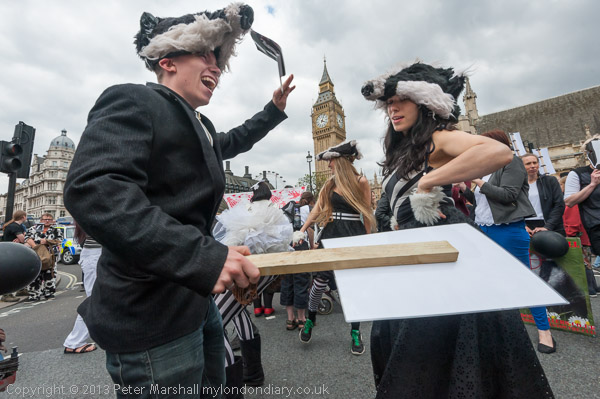 Badgers
dance in Parliament Square at the end of their protest
Badgers
dance in Parliament Square at the end of their protest
more pictures
More than a thousand people, many dressed in black and white and with badger masks or face paint, met outside Tate Britain for a protest march to Parliament to call a stop to the cull of badgers which became legal today.
Among the speakers at the rally outside Tate Britain before the march to Parliament was Queen guitarist Brian May who was applauded wildly for his work opposing the badger cull, which is now legal in the two pilot areas of Somerset and Gloucestershire.
Many of those present were clearly determined to do all they can to prevent the expected slaughter of around 5,000 animals in the six week culls, with some taking direct action to protect the badgers. Among the protesters were many who had travelled up from the pilot areas to London for this national protest.
Speakers argued that the cull flies in the face of most scientific opinion, and say that the government ministry responsible, DEFRA and Environment Secretary Owen Paterson only listen to those who support the cull. They also complain about the animal cruelty involved, with badgers being shot by largely untrained marksmen and they expect many to be only wounded and to suffer a lingering death. DEFRA's intention to record the sounds of the dying animals to establish the extent of the pain involved seems a callous approach. The protesters shouted 'Shame on DEFRA' and 'your cull, your lies, your greed.'
DEFRA say that studies show a cull of 70% of the badgers in an extended area could reduce the incidence of bovine TB by 16%, but it is unclear if they will be able to acheive this level of cull, and the return of a reduction of less than one sixth seems low. Those against the cull argue that it fails to get the the root of the problem, which is the over-stressing of cows in intensive farming to get higher milk yields that renders them more susceptible to bovine TB and other infections. Among the protesters were vegans calling for an end to our consumption of dairy products, with a dairy boycott to help save the badgers.
The cull is only one aspect of DEFRA's attempts to fight the increase in bovine TB, with other actions including tougher controls on cattle movements, more testing of herds and work on producing more effective vaccines. The cull is opposed by the Labour Party who have tabled a debate for Wednesday.
I had to leave before the march to Parliament to attend a memorial service,
but met many of the protesters later in the day continuing the protest in
Parliament Square, where many also joined with Unite Against Fascism in opposing
the British National Party. Some of them were shouting 'Cull the BNP, Not
the Badgers' and others in badger costumes danced on the road in front of
Parliament until they were cleared by police.
more pictures
London Supports Turkish Spring
Marble Arch, London. Sat 1 Jun 2013
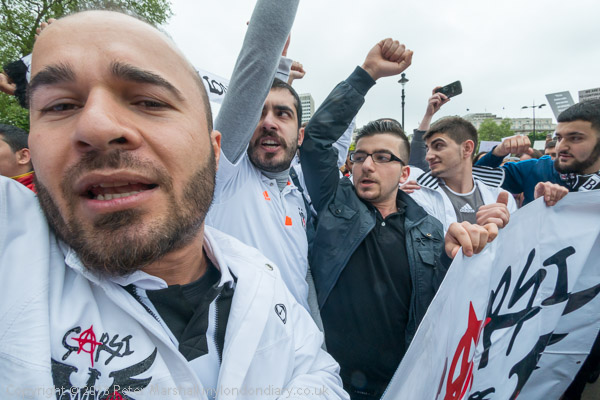
Garsi supporters chant and raise fists in support of the Gezi protesters
more pictures
Turks gathered in Hyde Park next to Marble Arch at the start of a march to the Turkish Embassy to show solidarity with the growing protests in Istanbul's Gezi Park and across Turkey against the Erdogan regime which has been called the 'Turkish Spring'
Already when I arrived a little after 11 am the corner of Hyde Park at Marble Arch was full of perhaps a thousand Turks, mainly from North London, waving placards and flags and chanting their support of the popular protests that have erupted over the past few days over Gezi Park. Although the first protests there were small and specifically over the loss of one of Istanbul's remaining green spaces for the building of a shopping mall, the brutal police repression with indiscriminate tear gassing, batoning and water cannons angered many, and the protest changed to a more general one against the authoritarian Erdogan regime, which many call fascist. As some of the placards and banners in London showed, many Turks see the government deliberately moving away from the secular state established as the basis for modern Turkey in the 1920s by Kemal Atatürk towards a conservative authoritarian Islamic dictatorship under Recep Tayyip Erdogan's Justice and Development Party (AKP).
As I got ready to leave for another event the protest was beginning to get
organised, with many sitting on the tarmac to listen to a speaker with a megaphone.
By late afternoon I heard they had marched to the Turkish Embassy in Belgrave
Square where there were now around 4,000 protesting in support of the 'Turkish
Spring'.
more pictures
top of page
All pictures on this section of the site are Copyright © Peter Marshall 2013; to buy prints or for permission to reproduce pictures or to comment on this site, or for any other questions, contact me.

